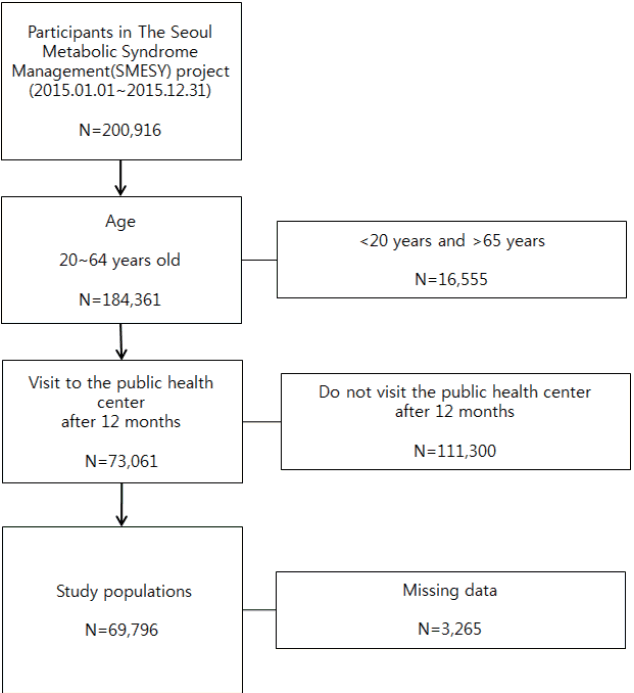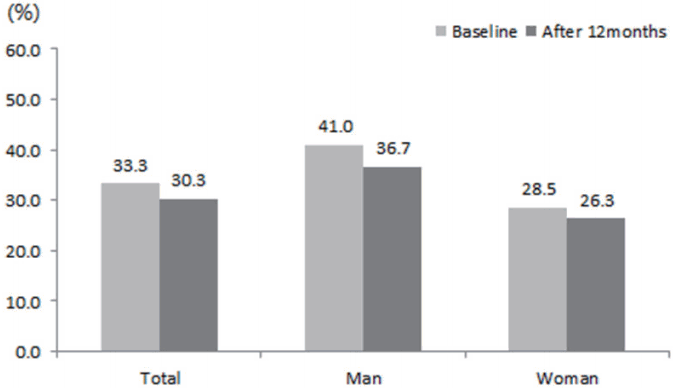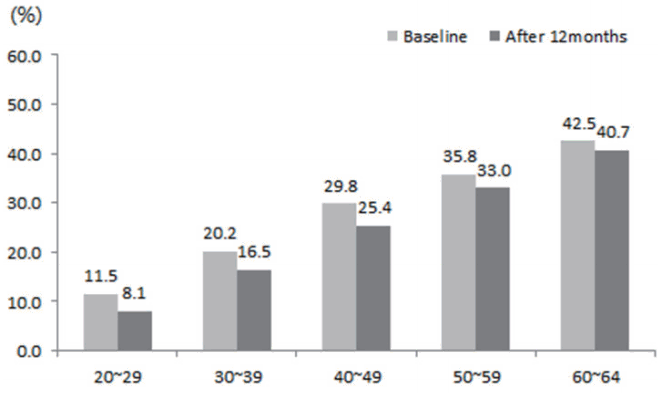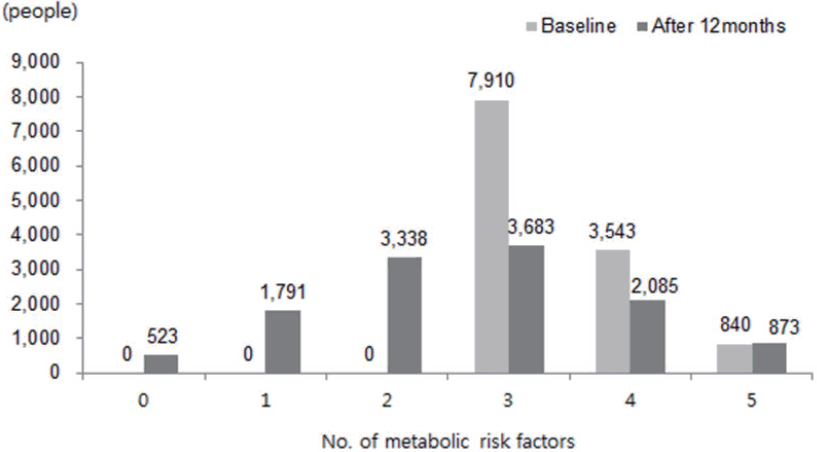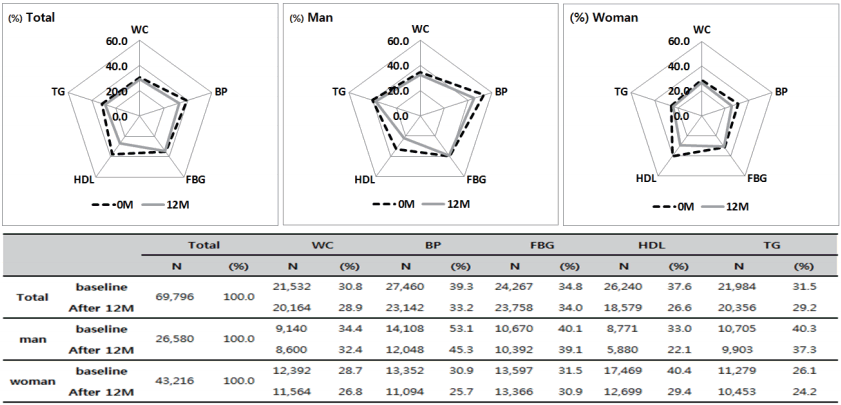 |
 |
- Search
| Public Health Aff > Volume 1(1); 2017 > Article |
|
Abstract
Objectives
Metabolic Syndrome (MetS) is an important issue in the primary care and public health, considered a complex set of cardiovascular risk factors and strongly associated to chronic diseases. Therefore, The Seoul Metabolic Syndrome Management (SMESY) project has suggested healthy lifestyles to residents in Seoul for MetS prevention and treatment. The aims of this study were to introduce the SMESY project and to evaluate the effect of SMESY in 2015.
Methods
Our study participants who participated in the SMESY project for 2015 were 20-64 years old. A total of 69,796 subjects were included in the final analysis. Based on metabolic risk factor test, the participants were classified into four groups and consulted on health related life style. We analyzed participants who were followed up after 12 months and compared them over time.
Results
After 12months, the prevalence of the participants who had at least three of the above five risk factors decreased from 33.3% to 30.3%. The prevalence of men (Ō¢Į4.3%) decreased more than women (Ō¢Į2.2%). The older age of participants, the higher the prevalence. However, the prevalence of younger participants has declined more after 12months. All metabolic risk factors were significantly decreased (HDL Ō¢Į11.0%, BP Ō¢Į6.2%, TG Ō¢Į2.3%, WC Ō¢Į2.0%, FBS Ō¢Į0.7%).
Conclusions
Non-communicable diseases are closely related to chronic lifestyle and a need to improve lifestyles or practice of health behavior. The SMESY project is the first public lifestyle intervention program of municipal unit in South Korea. The policy paradigm of this project is changing from ŌĆ£treatmentŌĆØ to ŌĆ£preventionŌĆØ. This project is effective in managing metabolic risk factors and expected to lead to great positive changes in the health of Seoul citizens.
ļ¦īņä▒ņ¦łĒÖśņØś ņśłļ░®Ļ│╝ Ļ┤Ćļ”¼ļ¼ĖņĀ£ļŖö ĻĄŁĻ░ĆņŚŁļ¤ē Ļ░ĢĒÖö ļ░Å ĻĄŁņĀ£ĒśæļĀź ņ”Øņ¦äļ░®ņĢłņŚÉ ļīĆĒĢ┤ 2011ļģä 9ņøö ĻĄŁņĀ£ņŚ░ĒĢ®(UN) Ļ│Āņ£äĻĖē ĒÜīņØśņŚÉņä£ ņĀĢņ▒ģņØśņĀ£ļĪ£ ņ▒äĒāØļÉĀ ļ¦īĒü╝ ņżæņÜöĒĢ£ Ļ│ĄĻ│Ąļ│┤Ļ▒┤ņØś ļ¼ĖņĀ£ņØ┤ļŗż. ļ¦īņä▒ņ¦łĒÖśņØĆ ņÜ░ļ”¼ļéśļØ╝ļ┐Éļ¦ī ņĢäļŗłļØ╝ ņĀä ņäĖĻ│äņĀüņ£╝ļĪ£ ņāØĒÖ£ņŖĄĻ┤ĆņØś ļ│ĆĒÖöņÖĆ ņØĖĻĄ¼Ļ│ĀļĀ╣ĒÖö, ņØśļŻīĻĖ░ņłĀņØś ļ░£ņĀä, ĻĖ░ļīĆņŚ¼ļ¬ģņØś ņ”ØĻ░Ć ļō▒ņ£╝ļĪ£ ņØĖĒĢśņŚ¼ ĻĖēĻ▓®ĒĢśĻ▓ī ņ”ØĻ░ĆĒĢśĻ│Ā ņ׳ņ¢┤, ņØ┤ļĪ£ ņØĖĒĢ£ ļ│┤Ļ▒┤ņØśļŻī ļ╣äņÜ®ņØś ļČĆļŗ┤Ļ│╝ ņé¼ļ¦ØļźĀ ņ”ØĻ░ĆļĪ£ ĻĄŁĻ░ĆņØś ņĢłņĀĢņä▒Ļ│╝ ĻĄŁļ»╝ņØś ņéČņØś ņ¦ł Ē¢źņāüņØä ņĀĆĒĢ┤ĒĢśĻ│Ā ņ׳ļŗż[1]. 2016ļģä ĻĄŁļ»╝Ļ▒┤Ļ░ĢĒåĄĻ│äņŚÉņä£ ņä£ņÜĖņŗ£ļ¦ī 30ņäĖ ņØ┤ņāü ņä▒ņØĖņØś Ļ│ĀĒśłņĢĢ ņ£Āļ│æļźĀņØĆ 2008ļģä 17.4%ņŚÉņä£ 2016ļģä 19.1%, ļŗ╣ļć©ļ│æ ņ£Āļ│æļźĀņØĆ 2008ļģä 6.5%ņŚÉņä£ 2016ļģä 7.7%ņ£╝ļĪ£ ņ”ØĻ░ĆĒĢśņśĆļŗż[2]. ļśÉĒĢ£ ņä£ņÜĖņŗ£ 2015ļģä ņé¼ļ¦ØņøÉņØĖĒåĄĻ│äņŚÉņä£ 10ļīĆ ņé¼ļ¦ØņøÉņØĖ ņżæ 1ņ£äļŖö ņĢö(30.9%)ņØ┤ļ®░, 2ņ£ä ņŗ¼ņן ņ¦łĒÖś(9.2%), 3ņ£ä ļćīĒśłĻ┤Ć ņ¦łĒÖś(8.6%) ņØ┤ņŚłņ£╝ļ®░, 3ļīĆ ņé¼ļ¦ØņøÉņØĖņØ┤ ņĀäņ▓┤ ņé¼ļ¦ØņøÉņØĖņØś 48.7%ļź╝ ņ░©ņ¦ĆĒĢ£ Ļ▓āņ£╝ļĪ£ ļéśĒāĆļéś, ļ¦īņä▒ ņ¦łĒÖś ņ£Āļ│æļźĀ ļ░Å ņØ┤ļĪ£ ņØĖĒĢ£ ņé¼ļ¦ØļźĀņØ┤ ņ”ØĻ░ĆĒĢśĻ│Ā ņ׳ļŗż.
ļīĆņé¼ņ”ØĒøäĻĄ░ņØĆ ļ│ĄļČĆļ╣äļ¦ī, ĒśłņĢĢņāüņŖ╣, ņ¦Ćņ¦łņØ┤ņāü, Ēśłļŗ╣ņāüņŖ╣ ļō▒ņØ┤ ņ¦łĒÖś ļ░£ļ│æ ņĀäļŗ©Ļ│äņØś ņāüĒā£ļĪ£ ņØ┤ļ¤¼ĒĢ£ ņ£äĒŚśņÜöņåīļōżņØ┤ 3Ļ░£ ņØ┤ņāü ļÅÖņŗ£ņŚÉ ļéśĒāĆļéśļŖö ļīĆņé¼ņĀü ņØ┤ņāü ņāüĒā£ņØ┤ļŗż[3]. 1998ļģäĻ│╝ 1999ļģä ņäĖĻ│äļ│┤Ļ▒┤ĻĖ░ĻĄ¼(WHO) ņé░ĒĢś ļŗ╣ļć©ļ│æ ņ£äņøÉĒÜīĻ░Ć ŌĆ£ļīĆņé¼ņ”ØĒøäĻĄ░(metabolic syndrome)ŌĆØņ£╝ļĪ£ ņĀĢņØśĒĢśĻ│Ā ļīĆņé¼ņ”ØĒøäĻĄ░ņØś ņ¦äļŗ©ņØä ņ£äĒĢ£ ņ×äņāüņĀü ĒŖ╣ņ¦ĢņØś Ļ░£ņÜöļź╝ ņĀ£ņŗ£ĒĢśņśĆļŗż[4]. ņØ┤Ēøä ļ»ĖĻĄŁ ņä▒ņØĖ ņĮ£ļĀłņŖżĒģīļĪż ĻĄÉņ£Ī ĒöäļĪ£ĻĘĖļש(National Cholesterol Education Adult Treatment Panel Ōģó, NCEPŌģó)ņŚÉņä£ ļīĆņé¼ņ”ØĒøäĻĄ░ ņ¦äļŗ©ĻĖ░ņżĆņØä ņĀ£ņŗ£ĒĢ£ ņØ┤Ēøä ļīĆņé¼ņ”ØĒøäĻĄ░ņØś ņ¦äļŗ©ĻĖ░ņżĆņØĆ ņŚ¼ļ¤¼ ļŗ©ņ▓┤ņŚÉņä£ļÅä ņĀ£ņŗ£ĒĢśņśĆļŗż. ļīĆņé¼ņ”ØĒøäĻĄ░ ņ£ĀņåīĻ▓¼ņ×ÉļŖö ĻĘĖļĀćņ¦Ć ņĢŖņØĆ ņé¼ļ×īņŚÉ ļ╣äĒĢ┤ ļŗ╣ļć©ļ│æ ļ░£ņāØ ņ£äĒŚśņØ┤ 7.47ļ░░[5], ņŗ¼ĒśłĻ┤Ćņ¦łĒÖś ļ░£ņāØ ņ£äĒŚśņØ┤ 2.35ļ░░, ņ┤Ø ņé¼ļ¦Øņ£äĒŚśņØś 1.58ļ░░ ņ”ØĻ░ĆĒĢśļŖö Ļ▓āņ£╝ļĪ£ ļéśĒāĆļé¼ļŗż[6]. ĻĖ░ņĪ┤ ļ│┤Ļ│ĀļÉ£ ĻĄŁļé┤ņÖĖņØś ļīĆņé¼ņ”ØĒøäĻĄ░ ņ£Āļ│æļźĀņØĆ ļ¦żņÜ░ ņāüņØ┤ĒĢ£ļŹ░ ĻĄŁĻ░Ćļ│ä, ņ¦äļŗ© ĻĖ░Ļ┤Ćļ│äļĪ£ ļīĆņé¼ņ”ØĒøäĻĄ░ņØś ņ¦äļŗ©ĻĖ░ņżĆņØ┤ ņāüņØ┤ĒĢśĻĖ░ ļĢīļ¼ĖņŚÉ ņØ┤ņŚÉ ļö░ļźĖ ņ£Āļ│æļźĀņŚÉļŖö ņ░©ņØ┤Ļ░Ć ņ׳ņ£╝ļ®░, ļĖīļØ╝ņ¦łņØä ņĀ£ņÖĖĒĢ£ ļīĆļČĆļČäņØś ļéśļØ╝ņŚÉņä£ ļé©ņä▒ņØ┤ ņŚ¼ņä▒ļ│┤ļŗż ņ£Āļ│æļźĀņØ┤ ļåÆĻ▓ī ļéśĒāĆļé¼ļŗż[7]. ļ»ĖĻĄŁņŚÉņä£ 20ņäĖ ņØ┤ņāü ņä▒ņØĖņØś 23.7%, 50ņäĖ ņØ┤ņāüņŚÉņä£ļŖö ņĢĮ 44%ņØś ļåÆņØĆ ņ£Āļ│æļźĀņØä ļ│┤ņØ┤Ļ│Ā ņ׳ņ£╝ļ®░[8], ņÜ░ļ”¼ļéśļØ╝ļÅä 1998ļģäņŚÉ ļ¦ī 19ņäĖ ņØ┤ņāü ņä▒ņØĖņØś ļīĆņé¼ņ”ØĒøäĻĄ░ ņ£Āļ│æļźĀņØ┤ ņĢĮ 25%ņśĆļŖöļŹ░ 2007ļģäņŚÉ ņĢĮ 31%ļĪ£ ņ”ØĻ░ĆĒĢśņśĆļŗż[9]. 2009ļģäļČĆĒä░ 2013ļģäĻ╣īņ¦ĆņØś ĻĄŁļ»╝Ļ▒┤Ļ░Ģļ│┤ĒŚśĻ│Ąļŗ© ņ×ÉļŻīļź╝ ļČäņäØĒĢ£ Ļ▓░Ļ│╝ņŚÉņä£ļÅä ļ¦ī 30ņäĖ ņØ┤ņāü ņä▒ņØĖņØś ļīĆņé¼ņ”ØĒøäĻĄ░ ņ£Āļ│æļźĀņØ┤ ņĢĮ 24%ņŚÉņä£ 26%ļĪ£ ņ”ØĻ░ĆĒĢśņśĆļŗż[10].
ņŗ¼ņןņ¦łĒÖś, ļćīņĪĖņżæ, ļŗ╣ļć©ļ│æņ£╝ļĪ£ ņØĖĒĢ£ ņĪ░ĻĖ░ņé¼ļ¦ØņØś 80%, ņĢöņØś 40%ļŖö ĻĖłņŚ░, ĻĘ£ņ╣ÖņĀüņØĖ ņÜ┤ļÅÖ, Ļ▒┤Ļ░ĢĒĢ£ ņŗØņØ┤ņØś ņŗżņ▓£ņØä ĒåĄĒĢ┤ņśłļ░® Ļ░ĆļŖźĒĢĀ Ļ▓āņØ┤ļØ╝Ļ│Ā ļ│┤Ļ│ĀĒĢśĻ│Ā ņ׳ļŗż[11]. ņØ┤Ļ▓āņØĆ ņ¦łļ│æņØś ņśłļ░®ņØä ĒåĄĒĢ┤ Ļ▓ĮņĀ£ņĀü ņåÉņŗżņØä ņĄ£ņåīĒÖöĒĢśĻ│Ā Ļ▒┤Ļ░ĢĻ┤Ćļ”¼ņØś ĒÜ©ņ£©ņä▒ ņĀ£Ļ│ĀļØ╝ļŖö ņĖĪļ®┤ņŚÉņä£ ļ¦żņÜ░ ņżæņÜöĒĢśļŗżĻ│Ā ĒĢĀ ņłś ņ׳ļŗż. ļ¦īņä▒ņ¦łĒÖśņØĆ ņןĻĖ░ņĀüņØĖ Ļ┤Ćļ”¼Ļ░Ć ĒĢäņÜöĒĢśļ®░ ņśłĒøäĻ░Ć ļČłĒÖĢņŗżĒĢśĻ│Ā, ņןĻĖ░Ļ░äņŚÉ Ļ▒Ėņ│ÉĻ┤Ćļ”¼Ļ░Ć ļÉśņ¦Ć ņĢŖņ£╝ļ®┤ ĒĢ®ļ│æņ”ØņØ┤ ļ░£ņāØĒĢśļŖö ĒŖ╣ņ¦ĢņØ┤ ņ׳ņ¢┤ ĒÅēņāØ ļÅÖņĢł Ļ┤Ćļ”¼ļź╝ ĒĢ┤ņĢ╝ ĒĢ£ļŗż. ļö░ļØ╝ņä£ 20~30ļīĆņŚÉļŖö ņ×Āņ×¼ņĀü ņ¦łĒÖśĻĄ░ņ£╝ļĪ£ ņ׳ļŗżĻ░Ć Ē¢źĒøä 40~50ļīĆņŚÉ ĒÅŁļ░£ņĀüņ£╝ļĪ£ ņ¦łĒÖśņ×ÉļĪ£ ņ”ØĻ░ĆĒĢśļŖö ņČöņäĖļĪ£ ļéśĒāĆļé©ņŚÉ ļö░ļØ╝ 20ļīĆ ņØ┤ĒøäļČĆĒä░ ņāØņĢĀ ņŻ╝ĻĖ░ ĒåĄĒĢ®Ļ▒┤Ļ░ĢĻ┤Ćļ”¼ ņä£ļ╣äņŖż ņĀ£Ļ│ĄņØ┤ ĒĢäņÜöĒĢśļŗż.
ņä£ņÜĖņŗ£ ļīĆņé¼ņ”ØĒøäĻĄ░ Ļ┤Ćļ”¼ņé¼ņŚģņØĆ ĻĖ░ņĪ┤ ņ¦łĒÖś ņżæņŗ¼ņØś Ļ▒┤Ļ░ĢĻ┤Ćļ”¼ ņä£ļ╣äņŖżņÖĆ ļŗ¼ļ”¼ 2009ļģäļČĆĒä░ ņĀäĻĄŁ ņĄ£ņ┤łļĪ£ ļ╣äļ¦ī ļ░Å ņŗ¼ļćīĒśłĻ┤Ć ņ¦łĒÖś, ļŗ╣ļć©ļ│æ ļō▒ņØś ļ¦īņä▒ņ¦łĒÖśņ£╝ļĪ£ ļ╣äļĪ»ļÉśļŖö Ļ▓ĮņĀ£ņĀü ļČĆļŗ┤Ļ│╝ Ļ│ĀĒåĄņŚÉ ņĀüĻĘ╣ņĀüņ£╝ļĪ£ ļīĆņ▓śĒĢśĻ│Āņ×É ļ¦īļōĀ ļ¦īņä▒ņ¦łĒÖś ņśłļ░®ņØä ņ£äĒĢ£ ĒåĄĒĢ®Ļ▒┤Ļ░ĢĻ┤Ćļ”¼ņØś Ēī©ļ¤¼ļŗżņ×äņ£╝ļĪ£, ņāØņåīĒĢśĻ│Ā ņ¢┤ļĀżņÜ┤ ŌĆśļīĆņé¼ņ”ØĒøäĻĄ░ŌĆÖņØä ņŗ£ļ»╝ļōżņŚÉĻ▓ī ņĢīĻĖ░ ņēĮĻ▓ī ņØ┤ĒĢ┤ņŗ£ĒéżĻ│Ā, Ļ▒┤Ļ░Ģņ▓┤Ēü¼ņÖĆ ņāüļŗ┤ņØä ĒåĄĒĢ┤ ļīĆņé¼ņ”ØĒøäĻĄ░ņØä ņśłļ░®ĒĢśĻ│Āņ×É ŌĆśļīĆņé¼ņ”ØĒøäĻĄ░ ņśżļØĮ(5’ź£)ĒöäļĪ£ņĀØĒŖĖļź╝ ņŗżņŗ£ĒĢśņśĆļŗż. ņØ┤ņŚÉ ņØ┤ ņøÉĻ│ĀņŚÉņä£ļŖö ņä£ņÜĖņŗ£ ļīĆņé¼ņ”ØĒøäĻĄ░Ļ┤Ćļ”¼ņé¼ņŚģņŚÉ ļīĆĒĢ£ ņåīĻ░£ņÖĆ ņØ╝Ļ░£ļģäļÅä(2015ļģä) ņé¼ņŚģ ņ░ĖņŚ¼ņ×Éļź╝ ļīĆņāüņ£╝ļĪ£ ņ▓½ ļō▒ļĪØ(0Ļ░£ņøö)ņØ┤Ēøä 12Ļ░£ņøö ļÅÖņĢł ļīĆņé¼ņ”ØĒøäĻĄ░ Ļ┤Ćļ”¼ļź╝ ļ░øņØĆ Ēøä ņé¼ņŚģņ░ĖņŚ¼ņ×ÉļōżņØś ņä▒ļ│ä, ņŚ░ļĀ╣ļ│ä ņ£Āļ│æļźĀ, ņ£äĒŚśņÜöņØĖņØś ļ│ĆĒÖöļź╝ ņé┤ĒÄ┤ļ│┤ņĢśļŗż.
ņä£ņÜĖņŗ£ ļīĆņé¼ņ”ØĒøäĻĄ░ Ļ┤Ćļ”¼ņé¼ņŚģ(The Seoul Metabolic Syndrome Management (SMESY) project)ņØĆ 2007ļģä 11ņøö ņä£ņÜĖņŗ£ņן ņ¦Ćņŗ£ņé¼ĒĢŁ(ņĀ£125. 2007. 11)ņ£╝ļĪ£ ņä£ņÜĖņŗ£ ļ│┤Ļ▒┤ņåī ĻĖ░ļŖź ĒÖ£ņä▒ĒÖö ļ░®ņĢłņØä ļ¦łļĀ©ĒĢśĻĖ░ ņ£äĒĢśņŚ¼ ņ▓śņØī Ļ│äĒÜŹĒĢśņśĆĻ│Ā(ņä£ņÜĖņØśļŻīņøÉ ņØśĒĢÖņŚ░ĻĄ¼ņåī ņĀĢņ▒ģņŚ░ĻĄ¼ņŗż, 2007), 2008ļģä 1ņøö ņä£ņÜĖņØśļŻīņøÉ ņØśĒĢÖņŚ░ĻĄ¼ņåī ņĀĢņ▒ģņŚ░ĻĄ¼ņŗż ļé┤ļČĆĻ│╝ņĀ£ļĪ£ ŌĆśņä£ņÜĖņŗ£ ļ│┤Ļ▒┤ņåī ņżæņןĻĖ░ ĻĖ░ļŖźĻ░£ĒÄĖņŚÉ Ļ┤ĆĒĢ£ņŚ░ĻĄ¼ŌĆÖļź╝ ļ│┤Ļ▒┤ņåīņŚÉņä£ ņśłļ░®ņżæņŗ¼ņØś ĒåĄĒĢ®Ļ▒┤Ļ░ĢĻ┤Ćļ”¼ņ▓┤Ļ│ä ĻĄ¼ņČĢņØä ĻČīĻ│ĀĒĢśļ®░ ņé¼ņŚģ ļ¬©ĒśĢ Ļ░£ļ░£ņØä ņŗ£ņ×æĒĢśņśĆļŗż. ņØ┤Ēøä 2009ļģä ŌĆś100ļ¦īņØĖ ļīĆņé¼ņ”ØĒøäĻĄ░ ņé¼ņŚģ(ņä▒ņØĖ)ŌĆÖņØ┤ ņä£ņÜĖņŗ£ļ»╝ Ļ▒┤Ļ░ĢĻ┤Ćļ”¼ Ļ░ĢĒÖöļź╝ ņ£äĒĢ£ ņä£ņÜĖņŗ£ ļ│┤Ļ▒┤ņåī 5ļīĆ ņżæņĀÉĻ▒┤Ļ░ĢĻ┤Ćļ”¼ ņé¼ņŚģņ£╝ļĪ£ ņäĀņĀĢļÉśņ¢┤ 2009ļģä 5ņøöņŚÉ ņä£ņÜĖņØśļŻīņøÉ ņØśĒĢÖņŚ░ĻĄ¼ņåī ņĀĢņ▒ģņŚ░ĻĄ¼ņŗż ļé┤ ŌĆśņä£ņÜĖņŗ£ ļīĆņé¼ņ”ØĒøäĻĄ░Ļ┤Ćļ”¼ņé¼ņŚģņ¦ĆņøÉļŗ©ŌĆÖņØä ĻĄ¼ņä▒ ļ░Å ņÜ┤ņśüĒĢśĻ▓ī ļÉśņŚłļŗż. 2009ļģä 6ņøöņŚÉ 10Ļ░£ĻĄ¼ ļ│┤Ļ▒┤ņåīņŚÉ ņŗ£ļ▓öņé¼ņŚģņ£╝ļĪ£ ļīĆņé¼ņ”ØĒøäĻĄ░ ņĀäļ¼ĖĻ┤Ćļ”¼ņä╝Ēä░ļź╝ ņäżņ╣śĒĢśņŚ¼ ņé¼ņŚģņØä ņŗ£ņ×æĒĢśĻ▓ī ļÉśņŚłļŗż. 2010ļģäļÅäņŚÉļŖö ņČöĻ░ĆļĪ£ 5Ļ░£ ļ│┤Ļ▒┤ņåīņŚÉ ņä╝Ēä░Ļ░Ć ņäżņ╣śļÉśņŚłĻ│Ā(ļłäņĀü 15Ļ░£ ļ│┤Ļ▒┤ņåī), 2011ļģäļÅäņŚÉ 10Ļ░£ ļ│┤Ļ▒┤ņåī(ļłäņĀü 25Ļ░£ ļ│┤Ļ▒┤ņåī)ņŚÉļÅä ņä╝Ēä░ļź╝ Ļ░£ņåīĒĢśņŚ¼ ļ╣äļĪ£ņåī ņä£ņÜĖņŗ£ 25Ļ░£ ļ│┤Ļ▒┤ņåī ņĀäņ▓┤ņŚÉ ņä£ņÜĖņŗ£ļ»╝ļōżņØä ļīĆņāüņ£╝ļĪ£ ĒĢ£ ļīĆņé¼ņ”ØĒøäĻĄ░ Ļ┤Ćļ”¼ņé¼ņŚģņØä ņÜ┤ņśüĒĢśĻ▓ī ļÉśņŚłļŗż.
2009ļģä ņé¼ņŚģ ņŗ£ņ×æ ņŗ£ĻĖ░ņŚÉļŖö ŌĆśļīĆņé¼ņ”ØĒøäĻĄ░ŌĆÖņØ┤ļ×Ć ņÜ®ņ¢┤Ļ░Ć ņāØņåīĒĢśņśĆļŗż. ĻĘĖļלņä£ ņŗ£ļ»╝ļōżņŚÉĻ▓ī ņēĮĻ│Ā ņ×¼ļ»Ėņ׳ļŖö ņÜ®ņ¢┤ņÖĆ ņé¼ņŚģņ×äņØä ņĢīļ”¼Ļ│Āņ×É ļīĆņé¼ņ”ØĒøäĻĄ░ ņ¦äļŗ© ņ£äĒŚśņÜöņØĖņØ┤ 5Ļ░Ćņ¦Ćņ×äņØä ņ░®ņĢłĒĢśņŚ¼ ŌĆśņä£ņÜĖņŗ£ņÖĆ ņśżļØĮ(5’ź£)ĒĢśņ×ÉŌĆÖ ņä£ņÜĖņŗ£ ļīĆņé¼ņ”ØĒøäĻĄ░ Ļ┤Ćļ”¼ņé¼ņŚģ ĒöäļĪ£ņĀØĒŖĖļĪ£ ļäżņØ┤ļ░Ź ĒĢśņśĆļŗż. ņśżļØĮ(5’ź£)ņØĆ ŌĆś1’ź£ ļ╣╝ņ×É ĒŚłļ”¼ļæśļĀł, 2’ź£ ļé┤ļ”¼ņ×É ĒśłņĢĢ, 3’ź£ ļ¦ēņ×É Ēśłļŗ╣, 4’ź£ ņ×Īņ×É ņżæņä▒ņ¦Ćļ░®, 5’ź£ ļåÆņØ┤ņ×É ņóŗņØĆ ņĮ£ļĀłņŖżĒģīļĪżŌĆÖņ£╝ļĪ£ ņé¼ņŚģ ņŖ¼ļĪ£Ļ▒┤ņØä ļ¦īļōżņŚłļŗż<Figure 1>.
ņä£ņÜĖņŗ£ ņ£äĒāüņ£╝ļĪ£ ŌĆśļīĆņé¼ņ”ØĒøäĻĄ░Ļ┤Ćļ”¼ņé¼ņŚģņ¦ĆņøÉļŗ©ŌĆÖņØä ņäżņ╣śŃåŹņÜ┤ņśüĒĢśņŚ¼ ņé¼ņŚģ ņĢłļé┤ņä£ ņĀ£ņ×æ ļ░░Ēż, ņĀäļ¼ĖĻĄÉņ£ĪĻ│╝ņĀĢ Ļ░£ļ░£ ļ░Å ņÜ┤ņśü, ņø╣ ĻĖ░ļ░ś ĒåĄĒĢ® DBņŗ£ņŖżĒģ£ ĻĄ¼ņČĢņÜ┤ņśü, ĒÖŹļ│┤Ļ│äĒÜŹ ņłśļ”Į ļ░Å ņŗżĒ¢ē ļō▒ņØś ņé¼ņŚģņØś ĒÖ£ņä▒ĒÖöļź╝ ļÅäļ¬©ĒĢśĻĖ░ ņ£äĒĢ£ ņ¦ĆņøÉņØä ņłśĒ¢ēĒĢśĻ│Ā ņ׳ļŗż. ņ×Éņ╣śĻĄ¼ 25Ļ░£ ļ│┤Ļ▒┤ņåīņŚÉņä£ļŖö ņä£ņÜĖĒŖ╣ļ│äņŗ£ ņŗ£ļ»╝Ļ▒┤Ļ░ĢĻĄŁ ļ│┤Ļ▒┤ņØśļŻīņĀĢņ▒ģĻ│╝ņÖĆ Ļ░ü ĻĄ¼ņØś ņĀĢņ▒ģ ļ░Å ņśłņé░ņØä ņ¦ĆņøÉļ░øņĢä ļīĆņé¼ņ”ØĒøäĻĄ░ ņĀäļ¼ĖĻ┤Ćļ”¼ņä╝Ēä░ļź╝ ĻĄ¼ņČĢĒĢśņŚ¼ ļīĆņé¼ņ”ØĒøäĻĄ░ Ļ┤Ćļ”¼ņé¼ņŚģņØä ņÜ┤ņśüĒĢśĻ│Ā ņ׳ļŗż.
ņä£ņÜĖņŗ£ ļīĆņé¼ņ”ØĒøäĻĄ░ Ļ┤Ćļ”¼ņé¼ņŚģņŚÉņä£ņØś ļīĆņé¼ņ”ØĒøäĻĄ░ ņ¦äļŗ©ĻĖ░ņżĆņØĆ 2005ļģä NCEP-ATPŌģó(National Cholesterol Education Program Adult Treatment Panel Ōģó) ĻĖ░ņżĆņØä ņé¼ņÜ®ĒĢśņśĆļŗż(ļŗ©, ļ│ĄļČĆļ╣äļ¦īņØś ĻĖ░ņżĆņØĆ 2005ļģä ļīĆĒĢ£ļ╣äļ¦īĒĢÖĒÜīņŚÉņä£ ņĀ£ņŗ£ĒĢ£ ĻĖ░ņżĆņØä ņé¼ņÜ®ĒĢ©). ĒŚłļ”¼ļæśļĀłļŖö ļé©ņ×É 90cm ņØ┤ņāü, ņŚ¼ņ×É 85cm ņØ┤ņāüņØĖ ņ×É, ĒśłņĢĢņØĆ ņØ┤ņÖäĻĖ░ ĒśłņĢĢņØ┤ 130mmHg ņØ┤ņāü, ņłśņČĢĻĖ░ ĒśłņĢĢņØ┤ 85mmHg ņØ┤ņāüņØĖ ņ×É ņØ┤Ļ▒░ļéś, ņ╣śļŻīņĀ£ļź╝ ļ│ĄņÜ® ņżæņØĖ ņ×É, Ļ│Ąļ│Ą ņŗ£ Ēśłļŗ╣ņØ┤ 100mg/dL ņØ┤ņāüņØ┤Ļ▒░ļéś ļŗ╣ļć©ļ│æ ņ╣śļŻīņĀ£ļź╝ ļ│ĄņÜ®ņżæņØĖ ņ×É, ņżæņä▒ņ¦Ćļ░®ņØ┤ 150mg/dL ņØ┤ņāüņØ┤Ļ▒░ļéś ņ╣śļŻīņĀ£ļź╝ ļ│ĄņÜ® ņżæņØĖ ņ×É, HDL ņĮ£ļĀłņŖżĒģīļĪżņØ┤ ļé©ņ×ÉļŖö 40mg/dL ļ»Ėļ¦īņØ┤Ļ▒░ļéś ņŚ¼ņ×ÉļŖö 50mg/dL ļ»Ėļ¦īņØ┤ļ®░ ņ╣śļŻīņĀ£ļź╝ ļ│ĄņÜ®ņżæņØĖ ņ×É ņØ┤ļŗż. ĻĄ░ ļČäļźśļŖö ņ£äņØś ņ£äĒŚśņÜöņØĖ ņżæ 3Ļ░£ ņØ┤ņāüņØä ļ│┤ņ£ĀĒĢśļ®┤ ļīĆņé¼ņ”ØĒøäĻĄ░, ņ£äĒŚśņÜöņØĖņØä 1Ļ░£ ļśÉļŖö 2Ļ░£ļź╝ ļ│┤ņ£ĀĒĢśļ®┤ Ļ▒┤Ļ░ĢņŻ╝ņØśĻĄ░, ņ£äĒŚśņÜöņØĖ Ļ░£ņłśņÖĆ ņāüĻ┤ĆņŚåņØ┤ ņ╣śļŻīņĀ£(Ļ│ĀĒśłņĢĢ, ļŗ╣ļć©, ņØ┤ņāüņ¦Ćņ¦łĒśłņ”Ø)ļź╝ ļ│ĄņÜ®ĒĢśļŖö Ļ▓ĮņÜ░ļŖö ņĢĮļ¼╝ņ╣śļŻīĻĄ░, ņ£äĒŚśņÜöņØĖņØä Ļ░¢Ļ│Ā ņ׳ņ¦Ć ņĢŖļŖö ņ×ÉļŖö ņĀĢņāüĻĄ░ņ£╝ļĪ£ ļČäļźśĒĢ£ļŗż<Table 1>.
ļīĆņé¼ņ”ØĒøäĻĄ░ Ļ┤Ćļ”¼ņé¼ņŚģņØś ĒöäļĪ£ņäĖņŖżļŖö Ēü¼Ļ▓ī ļ░£Ļ▓¼Ļ▓Ćņé¼(ļé┤ņåī(ņĀæņłś), ĻĖ░ņ┤ł ņäżļ¼Ėņ¦Ćņ×æņä▒, ĻĖ░ņĪ┤ Ļ▒┤Ļ░ĢĻ▓Ćņ¦äĻ▓░Ļ│╝ ĒÖ£ņÜ® ļśÉļŖö Ļ▓Ćņé¼ ņłśĒ¢ē, Ļ▓Ćņé¼Ļ▓░Ļ│╝ņŚÉ ļö░ļźĖ ĻĄ░ ļČäļźś Ēøä ņŗ£ņŖżĒģ£ ļō▒ļĪØ)ņÖĆ Ļ▒┤Ļ░ĢĻ┤Ćļ”¼ņāüļŗ┤ ļ░Å ņé¼ĒøäĻ┤Ćļ”¼(ĻĄ░ļ│ä Ē¢ēļÅÖļŗ©Ļ│ä ļČäļźś, ĻĄ░ļ│ä ņāüļŗ┤ ļ░Å ĻĄÉņ£Ī, ĻĄ░ļ│ä ņé¼ĒøäĻ┤Ćļ”¼, ĒÅēĻ░Ć, ņóģļŻī(Ēć┤ļĪØ)ņØś ļæÉ Ļ░Ćņ¦Ć Ļ│╝ņĀĢņ£╝ļĪ£ ĻĄ¼ļČäļÉśņ¢┤ 1ļģäĻ░ä Ļ┤Ćļ”¼ļź╝ ĒĢ£ļŗż. ĻĘĖļ”¼Ļ│Ā 1ļģä Ļ┤Ćļ”¼ Ēøä ļ│ĖņØĖņØś ļÅÖņØśĻ░Ć ņ׳ņØäņŗ£ ņ×¼ļō▒ļĪØĒĢśņŚ¼ ĻĄ░ļ│ä ĒöäļĪ£ņäĖņŖżņŚÉ ļ¦×ņČöņ¢┤ 1ļģäĻ░ä ņČöĻĄ¼Ļ┤Ćļ”¼ļź╝ ņĀ£Ļ│ĄĒĢśĻ│Ā ņ׳ļŗż. Ļ▒┤Ļ░ĢĻ┤Ćļ”¼ ņāüļŗ┤ ļ░Å ņé¼ĒøäĻ┤Ćļ”¼ ĒöäļĪ£ņäĖņŖżļź╝ ņé┤ĒÄ┤ļ│┤ļ®┤ ņ▓½ ĒÜīņŚÉļŖö ļīĆņāüņ×ÉņŚÉĻ▓ī ņØ╝ļīĆ ņØ╝(1:1)ļĪ£ ņØśņé¼ ļśÉļŖö Ļ░äĒśĖņé¼Ļ░Ć Ļ▓Ćņ¦ä Ļ▓░Ļ│╝ ļ░Å Ļ▒┤Ļ░ĢĻ┤Ćļ”¼ ┬Ę ņśüņ¢æ ┬Ę ņÜ┤ļÅÖņāüļŗ┤ņØä ĒĢäņłśņĀüņ£╝ļĪ£ ņĀ£Ļ│ĄĒĢśļÅäļĪØ ĒĢśĻ│Ā, ņØ┤ļĢī ņāüļŗ┤ņ×ÉļŖö ļīĆņāüņ×ÉņÖĆ ĒĢ©Ļ╗ś ļČĆļČäļ│ä Ē¢ēļÅÖĻ│äĒÜŹĒæ£ļź╝ ņ×æņä▒ĒĢśļÅäļĪØ ĒĢ£ļŗż. ņ▓śņØī ļ│┤Ļ▒┤ņåīņŚÉ ļé┤ļ░®ĒĢśņŚ¼ ļ░øņØĆ Ļ▓Ćņé¼ ļ░Å ņāüļŗ┤ņØä ĒżĒĢ©ĒĢśņŚ¼ ļīĆņé¼ņ”ØĒøäĻĄ░ņØĆ 3, 6, 9, 12Ļ░£ņøö ņŚ░Ļ░ä 5ĒÜī, Ļ▒┤Ļ░ĢņŻ╝ņØśĻĄ░Ļ│╝ ņĢĮļ¼╝ņ╣śļŻīĻĄ░ņØĆ 6Ļ░£ņøö, 12Ļ░£ņøö ņŚ░Ļ░ä 3ĒÜī, ņĀĢņāüĻĄ░ņØĆ 12Ļ░£ņøö ņŚ░Ļ░ä 2ĒÜī ļ│┤Ļ▒┤ņåīņŚÉ ļ░®ļ¼ĖĒĢśņŚ¼ Ļ▓Ćņ¦ä, Ļ▒┤Ļ░ĢņāüĒā£ ļ░Å ņāØĒÖ£ņŖĄĻ┤Ć Ļ░£ņäĀņĀĢļÅä ĒÅēĻ░ĆņÖĆ Ļ▒┤Ļ░ĢĻ┤Ćļ”¼ ┬Ę ņśüņ¢æ ┬Ę ņÜ┤ļÅÖņāüļŗ┤ņØä ņĀ£Ļ│Ą ļ░øļŖöļŗż. Ļ▓Ćņ¦ä Ēøä ņ¦łĒÖśņ×É ļ░£Ļ▓¼ ņŗ£ ļ│┤Ļ▒┤ņåī ņ¦äļŻīņŗż ļśÉļŖö ļ»╝Ļ░ä ļ│æņØśņøÉņŚÉņä£ Ļ┤ĆļĀ© ņ¦łĒÖśņØä ņ╣śļŻīĒĢśļÅäļĪØ ņĢłļé┤ĒĢśĻ│Ā, ĻĖ░ņ┤ł ņäżļ¼Ėņ¦Ćļź╝ ĒåĄĒĢ┤ ņāüļŗ┤Ļ│╝ ĻĄÉņ£ĪņØ┤ ĒĢäņÜöĒĢ£ ņśüņŚŁļ│äļĪ£ ļ│┤Ļ▒┤ņåīņØś ņŗ¼ļćīĒśłĻ┤Ćņ¦łĒÖśņśłļ░®Ļ┤Ćļ”¼ņé¼ņŚģ, ņśüņ¢æŃåŹņÜ┤ļÅÖĻĄÉņ£Ī ĒöäļĪ£ĻĘĖļש, ĻĖłņŚ░ņé¼ņŚģ, ņĀłņŻ╝ņé¼ņŚģ, ņĀĢņŗĀļ│┤Ļ▒┤ņä╝Ēä░ ļō▒ņ£╝ļĪ£ ņŚ░Ļ│äļź╝ ĒĢśĻ│Ā ņ׳ļŗż.
ļīĆņé¼ņ”ØĒøäĻĄ░ Ļ▓Ćņé¼ļŖö ļīĆņé¼ņ”ØĒøäĻĄ░ ņ¦äļŗ©ņŚÉ ĒĢäņÜöĒĢ£ ĒĢŁļ¬®ņØä ņ▓┤Ēü¼ĒĢśļŖö Ļ▓āņ£╝ļĪ£ ĒśłņĢĢĻ│äļĪ£ ĒśłņĢĢņĖĪņĀĢ, WHO ĒŚłļ”¼ļæśļĀł ņĖĪņĀĢ ĻĖ░ņżĆņŚÉ ļö░ļźĖ ĒŚłļ”¼ļæśļĀł ņĖĪņĀĢ, 10ņŗ£Ļ░ä ĻĖłņŗØņØä ņżĆņłśĒĢśņŚ¼ Ļ│Ąļ│ĄĒśłļŗ╣, HDL ņĮ£ļĀłņŖżĒģīļĪż, ņżæņä▒ņ¦Ćļ░®ņØĆ ĒśłņĢĪĻ▓Ćņé¼ļź╝ ĒåĄĒĢ┤ņä£ Ļ▓Ćņé¼ļź╝ ĒĢ£ļŗż. ĒśłņĢĪĻ▓Ćņé¼ļŖö ĒśäņןĻ▓Ćņé¼(Point of CareTest, POCT)ņÖĆ Ļ▓Ćņé¼ņŗż Ļ▓Ćņé¼(laboratory test)ņØś 2Ļ░Ćņ¦Ć ļ░®ļ▓Ģņ£╝ļĪ£ ņ¦äĒ¢ēĒĢśĻ│Ā ņ׳ļŗż.
ļīĆņé¼ņ”ØĒøäĻĄ░ Ļ┤Ćļ”¼ņé¼ņŚģ DBņŗ£ņŖżĒģ£ņØĆ ņé¼ņŚģņØś ĒÜ©ņ£©ņĀü ņÜ┤ņśüĻ│╝ ĒåĄĻ│äņ×ÉļŻīņØś ņāØņé░ ļ░Å ņŚģļ¼┤ņØś Ēæ£ņżĆĒÖöļź╝ ĒåĄĒĢ£ ņāØņé░ņä▒ Ē¢źņāüņØä ņ£äĒĢ┤ ĻĄ¼ņČĢĒĢśņśĆļŗż. 2009ļģäņŚÉ C/Sļ░®ņŗØņ£╝ļĪ£ ļŹ░ņØ┤Ēä░ ņ▓śļ”¼ļÉśņŚłņ£╝ļéś 2013ļģäļČĆĒä░ļŖö ņø╣ĻĖ░ļ░ś ĒÖśĻ▓Įņ£╝ļĪ£ ņĀäĒÖś ļÉśņ¢┤, ņŗżņŗ£Ļ░ä ļŹ░ņØ┤Ēä░ļ▓ĀņØ┤ņŖż ņāØņä▒Ļ│╝ ņāüņŗ£ ļŹ░ņØ┤Ēä░ ļ¬©ļŗłĒä░ļ¦üņØä ĒĢśĻ│Ā ņ׳ņ¢┤ ņé¼ņŚģņØś ņ¦łņĀü Ē¢źņāüņØä ļÅäļ¬©ĒĢśĻ│Ā ņ׳ļŗż. ņä£ņÜĖņŗ£ ļīĆņé¼ņ”ØĒøäĻĄ░Ļ┤Ćļ”¼ņé¼ņŚģ ļŹ░ņØ┤Ēä░ļ▓ĀņØ┤ņŖżļŖö ņä£ņÜĖņŗ£ ļŹ░ņØ┤Ēä░ņä╝Ēä░ņŚÉ ļ│┤Ļ┤ĆļÉśņ¢┤ Ļ┤Ćļ”¼ļÉśĻ│Ā ņ׳ļŗż.
2017ļģä Ēśäņ×¼ ļīĆņé¼ņ”ØĒøäĻĄ░ ņĀäļ¼ĖĻ┤Ćļ”¼ņä╝Ēä░ ņäżņ╣ś ĒśäĒÖ®ņØĆ 25Ļ░£ ļ│┤Ļ▒┤ņåī ņĀäļ¼ĖĻ┤Ćļ”¼ņä╝Ēä░, 9Ļ░£ ļ│┤Ļ▒┤ļČäņåī, 16Ļ░£ ļ│┤Ļ▒┤ņ¦Ćņåī, 54Ļ░£ ņ×Éņ╣śņä╝Ēä░ ļō▒ ņ┤Ø 114Ļ░£ņåīņŚÉ ņäżņ╣śļÉśņ¢┤ ņÜ┤ņśüļÉśĻ│Ā ņ׳ļŗż. ņé¼ņŚģņŚÉ ņ░ĖņŚ¼ ņØĖļĀźņØĆ ņØśņé¼, Ļ░äĒśĖņé¼, ņśüņ¢æņé¼, ņÜ┤ļÅÖņé¼ ļō▒ņ£╝ļĪ£ 400ļ¬ģņØ┤Ļ│Ā, ņØ┤ņżæ ņĀäļŗ┤ ņŚģļ¼┤ņØĖļĀźņØĆ 286ļ¬ģ, Ļ▓Ėņ×äņØĖļĀźņØĆ 114ļ¬ģņØ┤ļŗż[12]).
2009ļģä 1ņøö 1ņØ╝ļČĆĒä░ 2017ļģä 7ņøö 31ņØ╝Ļ╣īņ¦Ć ļ│┤Ļ▒┤ņåīņŚÉņä£ ļīĆņé¼ņ”ØĒøäĻĄ░ Ļ┤Ćļ”¼ņé¼ņŚģņŚÉ ļō▒ļĪØĒĢ£ ļīĆņāüņ×ÉņØś ņ┤Ø ļłäņĀü ļō▒ļĪØņØĖņøÉņØĆ 1,275,733ļ¬ģņØ┤ļŗż(2009ļģä 44,413ļ¬ģ, 2010ļģä 81,924ļ¬ģ, 2011ļģä 113,507ļ¬ģ, 2012ļģä 143,352ļ¬ģ, 2013ļģä 186,529ļ¬ģ, 2014ļģä 191,297ļ¬ģ, 2015ļģä 200,916ļ¬ģ, 2016ļģä 196,654ļ¬ģ, 2017ļģä 117,141ļ¬ģ).
ļ│Ė ņŚ░ĻĄ¼ļŖö 2015ļģäņŚÉ ņä£ņÜĖņŗ£ ļīĆņé¼ņ”ØĒøäĻĄ░ Ļ┤Ćļ”¼ņé¼ņŚģņŚÉ ļō▒ļĪØĒĢśņŚ¼ Ļ┤Ćļ”¼ļź╝ ļ░øņØĆ ļīĆņāüņ×Éļź╝ ņżæņŗ¼ņ£╝ļĪ£ ņ£Āļ│æļźĀĻ│╝ ļīĆņé¼ņ”ØĒøäĻĄ░ ņ£äĒŚśņÜöņØĖņØś ļ│ĆĒÖöļź╝ ĒÖĢņØĖĒĢśĻĖ░ ņ£äĒĢ£ ņä£ņłĀņĀü ņĪ░ņé¼ ņŚ░ĻĄ¼ņØ┤ļŗż.
ļ│Ė ņŚ░ĻĄ¼ļŖö ņä£ņÜĖņŗ£ 25Ļ░£ ļ│┤Ļ▒┤ņåīņŚÉņä£ ņłśĒ¢ēĒĢ£ ŌĆ£2015ļģä ņä£ņÜĖņŗ£ ļīĆņé¼ņ”ØĒøäĻĄ░ Ļ┤Ćļ”¼ņé¼ņŚģ ļŹ░ņØ┤Ēä░ļ▓ĀņØ┤ņŖż"ļź╝ ņØ┤ņÜ®ĒĢ£ 2ņ░© ņ×ÉļŻīļČäņäØņØ┤ļŗż.
ņŚ░ĻĄ¼ļīĆņāüņØĆ 2015ļģä 1ņøö 1ņØ╝ļČĆĒä░ 2015ļģä 12ņøö 31ņØ╝Ļ╣īņ¦Ć ņä£ņÜĖņŗ£ 25Ļ░£ ļ│┤Ļ▒┤ņåīņŚÉņä£ ļīĆņé¼ņ”ØĒøäĻĄ░ Ļ┤Ćļ”¼ņé¼ņŚģņŚÉ ļō▒ļĪØĒĢ£ ļ¦ī 20ņäĖ ņØ┤ņāü 64ņäĖ ņØ┤ĒĢś ņä▒ņØĖņØä ļīĆņāüņ£╝ļĪ£ ĒĢśņśĆļŗż. ļīĆņé¼ņ”ØĒøäĻĄ░ Ļ┤Ćļ”¼ļź╝ ļ░øņØĆ ļīĆņāüņ×É ņżæ 12Ļ░£ņøö ņØ┤Ēøä ļ│┤Ļ▒┤ņåīņŚÉ ļé┤ņåīĒĢśņŚ¼ ņĀäŃåŹĒøä ļŹ░ņØ┤Ēä░ ļ╣äĻĄÉļČäņäØņØ┤ Ļ░ĆļŖźĒĢ£ 73,061ļ¬ģņØä ņäĀņĀĢĒĢśņśĆņ£╝ļ®░, ņ×ģļĀź ņśżļźś ļ░Å Ļ▓░ņĖĪņ╣śļź╝ ņĀ£ņÖĖĒĢ£ Ēøä ļ│Ė ņŚ░ĻĄ¼ņØś ņĄ£ņóģ ņŚ░ĻĄ¼ļīĆņāüņ×ÉļŖö 69,796ļ¬ģņØ┤ļŗż<Figure 2>.
ņØĖĻĄ¼ņé¼ĒÜīĒĢÖņĀü ĒŖ╣ņä▒ņØĆ ņä▒ļ│ä, ņŚ░ļĀ╣, ĒĢÖļĀźņłśņżĆ, ļ░░ņÜ░ņ×É ņ£Āļ¼┤, ņøöĒÅēĻĘĀ Ļ░ĆĻĄ¼ņåīļōØ ļō▒ņØä ĒżĒĢ©ĒĢśņśĆļŗż. ņŚ░ļĀ╣ņØĆ 20ļīĆ, 30ļīĆ, 40ļīĆ, 50ļīĆ, 60ņäĖ~64ņäĖļĪ£ ĻĄ¼ļČäĒĢśņśĆĻ│Ā, ĒĢÖļĀźņłśņżĆņØĆ ņżæĒĢÖĻĄÉ ņĪĖņŚģ ņØ┤ĒĢś, Ļ│Āļō▒ĒĢÖĻĄÉ ņĪĖņŚģ, ļīĆĒĢÖĻĄÉ ņĪĖņŚģ(ņĀäļ¼ĖļīĆ ĒżĒĢ©) ņØ┤ņāüņ£╝ļĪ£ ĻĄ¼ļČäĒĢśņśĆļŗż. ļ░░ņÜ░ņ×É ņ£Āļ¼┤ļŖö ļ░░ņÜ░ņ×ÉņÖĆ ĒĢ©Ļ╗ś ņé┤Ļ│Ā ņ׳ļŖö Ļ▓ĮņÜ░ņÖĆ, ļ»ĖĒś╝, ņØ┤Ēś╝, ļ│äĻ▒░, ņé¼ļ│ä ļō▒ņØś ņØ┤ņ£ĀļĪ£ ļ░░ņÜ░ņ×ÉņÖĆ ĒĢ©Ļ╗ś ņé┤Ļ│Ā ņ׳ņ¦Ć ņĢŖņØĆ Ļ▓ĮņÜ░ļĪ£ ļéśļłäņŚłņ£╝ļ®░, ņøöĒÅēĻĘĀ Ļ░ĆĻĄ¼ņåīļōØņØĆ 199ļ¦ī ņøÉ ņØ┤ĒĢś, 200ļ¦īņøÉņŚÉņä£ 399ļ¦ī ņøÉ ņØ┤ĒĢś, 400ļ¦ī ņøÉ ņØ┤ņāüņ£╝ļĪ£ ļČäļźśĒĢśņśĆļŗż.
ņāØĒÖ£ņŖĄĻ┤Ć ņÜöņØĖņØĆ ĒØĪņŚ░, ņØīņŻ╝, ņÜ┤ļÅÖņāØĒÖ£ ņŗżņ▓£ņØśņ¦Ć ņŚ¼ļČĆĻ░Ć ĒżĒĢ©ļÉśņŚłļŗż. ĒØĪņŚ░ņØĆ ņ¦ĆĻĖłĻ╣īņ¦Ć ņé┤ņĢäņśżļŖö ļÅÖņĢł ĒĢ£ ļ▓łļÅä ļŗ┤ļ░░ļź╝ Ēö╝ņÜ┤ ņĀü ņŚåļŗżĻ│Ā ņØæļŗĄĒĢ£ ļ╣äĒØĪņŚ░ņ×ÉņÖĆ Ļ│╝Ļ▒░ņŚÉļŖö Ēö╝ņøĀņ£╝ļéś Ēśäņ×¼ Ēö╝ņÜ░ņ¦Ć ņĢŖņĢśļŗżļŖö Ļ│╝Ļ▒░ĒØĪņŚ░ņ×É, Ēśäņ×¼ ļŗ┤ļ░░ļź╝ Ēö╝ņÜ░Ļ│Ā ņ׳ļŖö Ēśäņ×¼ ĒØĪņŚ░ņ×ÉļĪ£ ļČäļźśĒĢśņśĆļŗż. ņØīņŻ╝ņØś Ļ▓ĮņÜ░ ņ¦ĆĻĖłĻ╣īņ¦Ć ņé┤ņĢäņśżļ®┤ņä£ 1ņ×ö ņØ┤ņāüņØś ņłĀņØä ļ¦łņŗĀ ņĀüņØ┤ ņ׳ļāÉļŖö ņ¦łļ¼ĖņŚÉ ļ¦łņģöļ│Ė ņĀüņØ┤ ņŚåļŗżļŖö ņ×ÉļŖö ņØīņŻ╝ ņĢłĒĢ©ņ£╝ļĪ£(ņĀ£ņé¼, ņ░©ļĪĆ ļĢī ļ¬ć ļ¬©ĻĖł ļ¦łņģöļ│Ė Ļ▓āņØĆ ņĀ£ņÖĖ ĒĢ©) ļ¦łņģöļ│Ė ņĀüņØ┤ ņ׳ļŖö Ļ▓ĮņÜ░ ņØīņŻ╝ ĒĢ© ņ£╝ļĪ£ ļČäļźś ļÉśņŚłļŗż. ņÜ┤ļÅÖņāØĒÖ£ ņŗżņ▓£ņØśņ¦Ć ņŚ¼ļČĆļŖö ņŻ╝ 5ĒÜī ņżæĻ░äĻ░ĢļÅä 30ļČä ņØ┤ņāü Ēś╣ņØĆ ņŻ╝ 3ĒÜī Ļ▓®ļĀ¼ĒĢ£ Ļ░ĢļÅäņØś 20ļČä ņØ┤ņāü ņÜ┤ļÅÖņØä ņŗżņ▓£ĒĢśĻ│Ā ņ׳ļŖÉļāÉņØś ļ¼╝ņØīņŚÉ ŌĆśļģĖļĀźĒĢĀ ņāØĻ░üņØ┤ ņŚåļŗż.ŌĆÖ, ŌĆśļģĖļĀźĒĢĀ ņāØĻ░üņØ┤ļŗż.ŌĆÖ, ŌĆśņØ┤ļ»Ė ļģĖļĀźĒĢśĻ│Ā ņ׳ļŗż.ŌĆÖļĪ£ ĻĄ¼ļČäĒĢśņśĆļŗż.
ļ│Ė ņŚ░ĻĄ¼ļŖö SPSS 20.0 ĒöäļĪ£ĻĘĖļשņØä ņØ┤ņÜ®ĒĢśņŚ¼ ļČäņäØĒĢśņśĆļŗż. ĻĄ░ļ│ä(ļīĆņé¼ņ”ØĒøäĻĄ░, Ļ▒┤Ļ░ĢņŻ╝ņØśĻĄ░, ņĢĮļ¼╝ņ╣śļŻīĻĄ░, ņĀĢņāüĻĄ░) ņØĖĻĄ¼ņé¼ĒÜīĒĢÖņĀü ņÜöņØĖ Ļ░ä ņ░©ņØ┤ļź╝ ĒÖĢņØĖĒĢśĻĖ░ ņ£äĒĢ┤ ņ╣┤ņØ┤ņĀ£Ļ│▒ Ļ▓ĆņĀĢ(Žć2)ņØä ņé¼ņÜ®ĒĢśņśĆļŗż. 1ļģäĻ░ä ļīĆņé¼ņ”ØĒøäĻĄ░ Ļ┤Ćļ”¼ņé¼ņŚģņŚÉ ņ░ĖņŚ¼ĒĢ£ ļīĆņāüņ×ÉļōżņØś ņ£äĒŚśņÜöņØĖ Ļ░£ņäĀņØä ĒÖĢņØĖĒĢśĻĖ░ ņ£äĒĢ┤ ņ¦Øņ¦äĻ▓ĆņĀĢ(paired t-test)ņØä ņØ┤ņÜ®ĒĢ£ ņĀäĒøäļ╣äĻĄÉļź╝ ņŗżņŗ£ĒĢśņśĆņ£╝ļ®░, ļīĆņé¼ņ”ØĒøäĻĄ░ ņ£äĒŚś ņÜöņØĖ Ļ░ä Ļ░£ņäĀļÉ£ ņÜöņØĖņØä ņ░ŠĻĖ░ ņ£äĒĢ┤ ņÜöņØĖļ│ä ļČäņäØņØä ņŗżņŗ£ĒĢśņśĆļŗż. ļśÉĒĢ£ ļīĆņé¼ņ”ØĒøäĻĄ░ ĻĄ░ļ│ä ņ£äĒŚśņÜöņØĖ Ļ░£ņłśņØś ļ│ĆĒÖöļź╝ ļČäņäØĒĢśĻĖ░ ņ£äĒĢ┤ ANCOVA(analysis of covariance) ļČäņäØņØä ņØ┤ņÜ®ĒĢśņŚ¼ ņØĖĻĄ¼ņé¼ĒÜīĒĢÖņĀü ĒŖ╣ņä▒Ļ│╝ ņāØĒÖ£ņŖĄĻ┤ĆņÜöņØĖņØĆ ļ│┤ņĀĢĒĢśņśĆĻ│Ā, ņé¼ĒøäĻ▓ĆņĀĢņØĆ ļ│ĖĒÄśļĪ£ļŗłņØś Ļ▓ĆņĀĢ(Bonferroni test)ņØä ņŗ£Ē¢ēĒĢśņśĆļŗż.
ļ│Ė ņŚ░ĻĄ¼ņØś ļīĆņāüņ×É 69,796ļ¬ģņØś ĒÅēĻĘĀņŚ░ļĀ╣ņØĆ 51.0ņäĖņØ┤ļŗż. ĻĄ░ļ│ä ĒÅēĻĘĀņŚ░ļĀ╣ņØä ļ│┤ļ®┤ ļīĆņé¼ņ”ØĒøäĻĄ░ņØĆ 50.8ņäĖ, Ļ▒┤Ļ░ĢņŻ╝ņØśĻĄ░ 49.5ņäĖ, ņĢĮļ¼╝ņ╣śļŻīĻĄ░ 57.4ņäĖ, ņĀĢņāüĻĄ░ 46.3ņäĖļĪ£ ņĢĮļ¼╝ņ╣śļŻīĻĄ░ņØś ĒÅēĻĘĀ ņŚ░ļĀ╣ņØ┤ Ļ░Ćņן ļåÆĻ│Ā ņĀĢņāüĻĄ░ņØś ĒÅēĻĘĀņŚ░ļĀ╣ņØ┤ Ļ░Ćņן ļé«ņĢśļŗż. ņä▒ļ│äņØĆ ņŚ¼ņ×ÉĻ░Ć 61.9%, ļé©ņ×ÉĻ░Ć 38.1%ļĪ£ ņŚ¼ņä▒ ļīĆņāüņ×ÉĻ░Ć ļ¦ÄņĢśļŗż. ĻĄ░ļ│äļĪ£ļŖö ļīĆņé¼ņ”ØĒøäĻĄ░ņØś Ļ▓ĮņÜ░ ņŚ¼ņä▒ņØ┤ 48.2%, ļé©ņä▒ņØ┤ 51.8%ļĪ£ ņä▒ļ╣äĻ░Ć Ēü¼ņ¦Ć ņĢŖņĢśņ£╝ļéś, Ļ▒┤Ļ░ĢņŻ╝ņØśĻĄ░(ņŚ¼ņä▒ 63.4% VS. ļé©ņä▒ 36.6%), ņĢĮļ¼╝ņ╣śļŻīĻĄ░(ņŚ¼ņä▒ 62.4% VS. ļé©ņä▒ 37.6%), ņĀĢņāüĻĄ░(ņŚ¼ņä▒ 73.9% VS. ļé©ņä▒ 26.1%)ņØś Ļ▓ĮņÜ░ ļŗżņåī ņ░©ņØ┤Ļ░Ć ņ׳ņŚłļŗż. ņŚ░ļĀ╣ļ│äļĪ£ ņé┤ĒÄ┤ļ│┤ļ®┤ 20ļīĆĻ░Ć 6.0%, 30ļīĆĻ░Ć 10.7%, 40ļīĆĻ░Ć 18.2%, 50ļīĆĻ░Ć 40.0%, 60ņäĖņŚÉņä£ 64ņäĖĻ░Ć 25.1%ļĪ£ ļéśņØ┤Ļ░Ć ļ¦ÄņØäņłśļĪØ ņé¼ņŚģņŚÉ ņ░ĖņŚ¼ĒĢśļŖö ļ╣äņżæņØ┤ ļåÆņĢśļŗż. ĒĢÖļĀź ņłśņżĆņØĆ ņżæĒĢÖĻĄÉ ņĪĖņŚģ ņØ┤ĒĢśĻ░Ć 14.2%, Ļ│Āļō▒ĒĢÖĻĄÉ Ļ╣īņ¦Ć ņĪĖņŚģĒĢ£ ļīĆņāüņ×ÉĻ░Ć 27.0%, ņĀäļ¼ĖļīĆ ņØ┤ņāü ņĪĖņŚģĒĢ£ ļīĆņāüņ×ÉĻ░Ć 51.1%ļĪ£ ņĀäļ¼ĖļīĆ ņØ┤ņāü ņĪĖņŚģĒĢ£ ļīĆņāüņ×ÉĻ░Ć Ļ░Ćņן ļ¦ÄņĢśļŗż. ņé¼ņŚģņŚÉ ņ░ĖņŚ¼ĒĢ£ ļīĆņāüņ×ÉņØś 82.4%Ļ░Ć ļ░░ņÜ░ņ×ÉņÖĆ ĒĢ©Ļ╗ś ņé┤Ļ│Ā ņ׳ņŚłņ£╝ļ®░,17.6%Ļ░Ć ļ»ĖĒś╝, ņØ┤Ēś╝, ļ│äĻ▒░, ņé¼ļ│ä ļō▒ņØś ņØ┤ņ£ĀļĪ£ ļ░░ņÜ░ņ×ÉņÖĆ ĒĢ©Ļ╗ś ņé┤ņ¦Ć ņĢŖņĢśļŗż. ņøöĒÅēĻĘĀ Ļ░ĆĻĄ¼ņåīļōØņØĆ 199ļ¦ī ņøÉ ņØ┤ĒĢśĻ░Ć 17.3%, 200ļ¦īņøÉņŚÉņä£ 399ļ¦ī ņøÉ ņØ┤ĒĢśĻ░Ć 46.2%, 400ļ¦ī ņøÉ ņØ┤ņāüņØ┤ 19.7%ņØ┤ņŚłļŗż. ņāØĒÖ£ņŖĄĻ┤Ć ņÜöņØĖ ņżæ ĒØĪņŚ░ ņāüĒā£ļŖö ļ╣äĒØĪņŚ░ņ×ÉĻ░Ć 80.8%, Ļ│╝Ļ▒░ĒØĪņŚ░ņ×ÉĻ░Ć 10.5%, Ēśäņ×¼ĒØĪņŚ░ņ×ÉĻ░Ć 8.7%ņØ┤ņŚłĻ│Ā, ņØīņŻ╝ļŖö ņØīņŻ╝ļź╝ ĒĢśņ¦Ć ņĢŖļŖö ņ×ÉĻ░Ć 46.2%, ņØīņŻ╝ļŖö ĒĢśļŖö ņ×ÉĻ░Ć 53.8%ņśĆļŗż. ņÜ┤ļÅÖņāØĒÖ£ ņŗżņ▓£ņØśņ¦Ć ņŚ¼ļČĆļŖö ļģĖļĀźĒĢĀ ņāØĻ░üņØ┤ ņŚåļŗż ņØæļŗĄņ×ÉĻ░Ć 2.8%, ļģĖļĀźĒĢĀ ņśłņĀĢņØ┤ļŗż ņØæļŗĄņ×ÉĻ░Ć 34.8%, ņØ┤ļ»Ė ņÜ┤ļÅÖņŗżņ▓£ ņżæņØ┤ļŗż ņØæļŗĄņ×ÉļŖö 62.4%ņśĆļŗż<Table 2>.
2015ļģä ļ│Ė ņŚ░ĻĄ¼ņŚÉ ņ▓śņØī ņ░ĖņŚ¼ĒĢśļŖö ļīĆņāüņ×É ņżæ ņ£äĒŚśņÜöņØĖņØä 3Ļ░£ ņØ┤ņāü Ļ░Ćņ¦ä ņ×ÉļŖö 33.3%ņśĆņ£╝ļéś, 12Ļ░£ņøö ņØ┤ĒøäņŚÉļŖö 30.3%ļĪ£ ņ£Āļ│æļźĀņØ┤ 3.0% Ļ░ÉņåīĒĢśņśĆļŗż. ņä▒ļ│äņŚÉ ļö░ļØ╝ ņé┤ĒÄ┤ļ│┤ļ®┤ ļé©ņä▒ņØĆ ņ▓śņØī ļō▒ļĪØ ņŗ£ 41.0%ņŚÉņä£ 36.7%ļĪ£ 4.3% Ļ░ÉņåīĒĢśņśĆņ£╝ļ®░, ņŚ¼ņä▒ņØĆ 28.5%ņŚÉņä£ 26.3%ļĪ£ 2.2% Ļ░ÉņåīĒĢśņśĆļŗż. ņĀäļ░śņĀüņ£╝ļĪ£ ņŚ¼ņä▒ņŚÉ ļ╣äĒĢ┤ ļé©ņä▒ņØś ņ£Āļ│æļźĀņØ┤ ļåÆņĢśņ£╝ļéś, 12Ļ░£ņøö ņØ┤Ēøä ļé©ņä▒ņŚÉņä£ ņ£Āļ│æļźĀņØ┤ ļŹö Ēü░ ĒÅŁņ£╝ļĪ£ Ļ░ÉņåīĒ¢łļŗż<Figure 3>.
ņŚ░ļĀ╣ļ│ä ņ£Āļ│æļźĀņØä ņé┤ĒÄ┤ļ│┤ļ®┤ 20ļīĆ 11.5%, 30ļīĆ 20.2%, 40ļīĆ 29.8%, 50ļīĆ 35.8%, 60ņäĖ~64ņäĖ 42.5%ļĪ£ ņŚ░ļĀ╣ņØ┤ ļåÆņĢäņ¦łņłśļĪØ ņ£Āļ│æļźĀņØ┤ ļåÆņĢäņ¦äļŗż. ļśÉĒĢ£ 12Ļ░£ņøö ņØ┤Ēøä ņ£Āļ│æļźĀņØä ņé┤ĒÄ┤ļ│┤ļ®┤ 20ļīĆ 8.1%, 30ļīĆ 16.5%, 40ļīĆ 25.4%, 50ļīĆ 33.0%, 60ņäĖ~64ņäĖ 40.7%ļĪ£ ļ¬©ļōĀ ņŚ░ļĀ╣ņĖĄņŚÉņä£ ņ£Āļ│æļźĀņØ┤ Ļ░ÉņåīĒĢśļ®░ 40ļīĆņŚÉņä£(Ō¢Į4.4%) ņ£Āļ│æļźĀņØ┤ Ļ░Ćņן ļ¦ÄņØ┤ Ļ░ÉņåīĒĢśņśĆĻ│Ā, 30ļīĆ(Ō¢Į3.7%), 20ļīĆ(Ō¢Į3.4%), 50ļīĆ(Ō¢Į2.8%), 60ņäĖ~64ņäĖ(Ō¢Į1.8%) ņł£ņ£╝ļĪ£ Ļ░ÉņåīĒ¢łļŗż<Figure 4>.
ļīĆņé¼ņ”ØĒøäĻĄ░ņØś Ļ▓ĮņÜ░, ļ¬©ļōĀ ļīĆņé¼ņ”ØĒøäĻĄ░ ņ£äĒŚśņÜöņØĖņØ┤ 12Ļ░£ņøö ņØ┤Ēøä ņ£ĀņØśĒĢ£ Ļ░Éņåīļź╝ ļ│┤ņśĆļŗż. ĒŚłļ”¼ļæśļĀł ĒÅēĻĘĀņØ┤ ļé©ņ×ÉļŖö 0.9cm, ņŚ¼ņ×ÉļŖö 1.0cm Ļ░ÉņåīĒ¢łņ£╝ļ®░, ņłśņČĢĻĖ░ ĒśłņĢĢņØĆ 3.9mmHg, ņØ┤ņÖäĻĖ░ ĒśłņĢĢņØĆ 2.3mmHg Ļ░ÉņåīĒ¢łļŗż, Ēśłļŗ╣ņØĆ
2.8mg/dL Ļ░ÉņåīĒ¢łņ£╝ļ®░, HDL ņĮ£ļĀłņŖżĒģīļĪżņØś Ļ▓ĮņÜ░ ļé©ņ×ÉļŖö 4.2mg/dL, ņŚ¼ņ×ÉļŖö 5.7mg/dL ņ”ØĻ░ĆĒĢśņśĆļŗż. ņżæņä▒ņ¦Ćļ░®ņØś Ļ▓ĮņÜ░ 29.0mg/dL Ļ░ÉņåīĒĢśņśĆļŗż. Ļ▒┤Ļ░ĢņŻ╝ņØśĻĄ░ņØś Ļ▓ĮņÜ░ 12Ļ░£ņøö ņØ┤Ēøä ĒŚłļ”¼ļæśļĀł Ļ░£ņäĀņØĆ ļ»Ėļ»ĖĒĢśĻ│Ā ļé©ņä▒ņØś HDL ņĮ£ļĀłņŖżĒģīļĪżņØ┤ 1.6mg/dL ņ”ØĻ░Ć, ņŚ¼ņä▒ņØś HDL ņĮ£ļĀłņŖżĒģīļĪżņØ┤ 3.4mg/dL ņ”ØĻ░ĆĒĢśņśĆĻ│Ā ļŗżļźĖ ņ£äĒŚś ņÜöņØĖ Ļ░ä Ēü░ ņ░©ņØ┤ļŖö ņŚåņŚłļŗż. ņĢĮļ¼╝ņ╣śļŻīĻĄ░ņØś Ļ▓ĮņÜ░ Ēśłļŗ╣Ļ│╝ ņżæņä▒ņ¦Ćļ░®ņØĆ 12Ļ░£ņøö ņØ┤Ēøä ļ│ĆĒÖöĻ░Ć ņŚåņŚłņ£╝ļ®░ ļé©ņä▒ņØś HDL ņĮ£ļĀłņŖżĒģīļĪżņØ┤ 2.3mg/dL ņ”ØĻ░Ć, ņŚ¼ņä▒ņØś HDL ņĮ£ļĀłņŖżĒģīļĪżņØ┤ 2.6mg/dL ņ”ØĻ░ĆĒ¢łļŗż. ņĀĢņāüĻĄ░ņØś Ļ▓ĮņÜ░ ļ¬©ļōĀ ņ£äĒŚśņÜöņØĖņØś ĒÅēĻĘĀņØ┤ ļŗżņåī ņ”ØĻ░ĆĒ¢łļŗż<Table 3>.
12Ļ░£ņøö ņØ┤Ēøä ņ£äĒŚśņÜöņØĖ Ļ░£ņłśļ│ĆĒÖöļź╝ ņé┤ĒÄ┤ļ│┤ļ®┤ ļīĆņé¼ņ”ØĒøäĻĄ░ņØś Ļ▓ĮņÜ░ 0.8Ļ░£, Ļ▒┤Ļ░ĢņŻ╝ņØśĻĄ░ņØś Ļ▓ĮņÜ░ 0.12Ļ░£, ņĢĮļ¼╝ņ╣śļŻīĻĄ░ņØś Ļ▓ĮņÜ░ 0.24Ļ░£ Ļ░ÉņåīĒĢśņśĆļŗż. ņØ┤ļ¤¼ĒĢ£ Ļ▓░Ļ│╝ļŖö ņä▒, ņŚ░ļĀ╣ ĻĘĖļŻ╣, ĒĢÖļĀźņłśņżĆ, ļ░░ņÜ░ņ×É ņ£Āļ¼┤, ņøöĒÅēĻĘĀ Ļ░ĆĻĄ¼ņåīļōØ, ĒØĪņŚ░ ņāüĒā£, ņØīņŻ╝ ņŚ¼ļČĆ, ņÜ┤ļÅÖņāØĒÖ£ ņŗżņ▓£ņØśņ¦Ć ņÜöņØĖņØä ļ│┤ņĀĢĒĢśņśĆņ£╝ļ®░ 95% ņŗĀļó░ņłśņżĆņŚÉņä£ ĒåĄĻ│äņĀüņ£╝ļĪ£ ņ£ĀņØśĒĢśņśĆļŗż<Figure 5>.
ņ▓śņØī ļīĆņé¼ņ”ØĒøäĻĄ░ņ£╝ļĪ£ ĒīÉņĀĢļÉ£ 12,293ļ¬ģņØ┤ 12Ļ░£ņøö ņØ┤ĒøäņŚÉļŖö 6,641ļ¬ģ(54.0%)ņ£╝ļĪ£ Ļ░ÉņåīĒ¢łļŗż. 5,652ļ¬ģ(46.0%)ņØĆ 12Ļ░£ņøö ņØ┤Ēøä ļīĆņé¼ņ”ØĒøäĻĄ░ ņ£äĒŚśņÜöņØĖ Ļ░£ņłśĻ░Ć 2Ļ░£ ņØ┤ĒĢśņśĆņ£╝ļ®░, ņØ┤ ņżæ 523ļ¬ģ(4.3%)ņØĆ ļīĆņé¼ņ”ØĒøäĻĄ░ ņ£äĒŚśņÜöņØĖ Ļ░£ņłśĻ░Ć 0Ļ░£Ļ░Ć ļÉśņŚłļŗż<Figure 6>.
ļīĆņé¼ņ”ØĒøäĻĄ░ ņ£äĒŚśņÜöņØĖļ│ä ņ£Āļ│æļźĀ ļ│ĆĒÖöļź╝ ņé┤ĒÄ┤ļ│┤ļ®┤ ņ▓śņØī ļō▒ļĪØ ņŗ£ ĒśłņĢĢ(39.3%), HDL ņĮ£ļĀłņŖżĒģīļĪż(37.6%), Ēśłļŗ╣(34.8%), ņżæņä▒ņ¦Ćļ░®(31.5%), ĒŚłļ”¼ļæśļĀł(30.8%)ņł£ņ£╝ļĪ£ ņ£äĒŚśņÜöņØĖ ņ£Āļ│æļźĀņØ┤ ļåÆņĢśņ£╝ļéś 12Ļ░£ņøö ņØ┤Ēøä Ēśłļŗ╣(34.0%), ĒśłņĢĢ(33.2%), ņżæņä▒ņ¦Ćļ░®(29.2%), ĒŚłļ”¼ļæśļĀł(28.9%), HDL ņĮ£ļĀłņŖżĒģīļĪż(26.6%) ņł£ņ£╝ļĪ£ ņ£äĒŚśņÜöņØĖ ņ£Āļ│æļźĀņØ┤ ļåÆņĢśļŗż. ņ£äĒŚśņÜöņØĖļ│ä ņ£Āļ│æļźĀ Ļ░Éņåī ļ╣äņ£©ņØĆ HDL ņĮ£ļĀłņŖżĒģīļĪżņØ┤ 11.0% Ļ░ÉņåīĒĢśņŚ¼ ņ£äĒŚśņÜöņØĖ ņżæ Ļ░Ćņן ļ¦ÄņØ┤ Ļ░ÉņåīĒĢ£ ņÜöņØĖņØ┤ļ®░, ĒśłņĢĢ(6.2%), ņżæņä▒ņ¦Ćļ░®(2.3%), ĒŚłļ”¼ļæśļĀł(2.0%), Ēśłļŗ╣(0.7%), ņł£ņ£╝ļĪ£ ņ£äĒŚśņÜöņØĖņØś Ļ░Éņåī ļ╣äņżæņØ┤ ļåÆņĢśļŗż. ņØ┤ļź╝ ņä▒ļ│äņŚÉ ļö░ļØ╝ ņé┤ĒÄ┤ļ│┤ļ®┤ ļé©ņä▒ņØś Ļ▓ĮņÜ░ ĒśłņĢĢ(53.1%), ņżæņä▒ņ¦Ćļ░®(40.3%), Ēśłļŗ╣(40.1%), ĒŚłļ”¼ļæśļĀł(34.4%), HDL ņĮ£ļĀłņŖżĒģīļĪż(33.0%) ņł£ņ£╝ļĪ£ ņ£äĒŚśņÜöņØĖņØä ļ¦ÄņØ┤ Ļ░Ćņ¦ĆĻ│Ā ņ׳Ļ│Ā, ņŚ¼ņä▒ņØś Ļ▓ĮņÜ░ HDL ņĮ£ļĀłņŖżĒģīļĪż(40.4%), Ēśłļŗ╣(31.5%), ĒśłņĢĢ(30.9%), ĒŚłļ”¼ļæśļĀł(28.7%), ņżæņä▒ņ¦Ćļ░®(26.1%) ņł£ņ£╝ļĪ£ ņ£äĒŚśņÜöņØĖ ļ╣äņżæņØ┤ ļåÆņĢśļŗż<Figure 7>.
ņä£ņÜĖņŗ£ ļīĆņé¼ņ”ØĒøäĻĄ░Ļ┤Ćļ”¼ņé¼ņŚģņŚÉ ļīĆĒĢ£ ņåīĻ░£ņÖĆ ņØ╝Ļ░£ļģäļÅä(2015ļģä) ņé¼ņŚģ ņ░ĖņŚ¼ņ×Éļź╝ ļīĆņāüņ£╝ļĪ£ ņ▓½ ļō▒ļĪØ(0Ļ░£ņøö)ņØ┤Ēøä 12Ļ░£ņøöļÅÖņĢł ļīĆņé¼ņ”ØĒøäĻĄ░ Ļ┤Ćļ”¼ļź╝ ļ░øņØĆ Ēøä ņä▒ļ│ä, ņŚ░ļĀ╣ļ│ä ņ£Āļ│æļźĀ, ņ£äĒŚśņÜöņØĖņØś ļ│ĆĒÖöļź╝ ņé┤ĒÄ┤ļ│┤ņĢśļŗż.
ņä£ņÜĖņŗ£ ļīĆņé¼ņ”ØĒøäĻĄ░ Ļ┤Ćļ”¼ņé¼ņŚģņØĆ ļ│┤Ļ▒┤ņØśļŻīņØś ņĀĢņ▒ģ Ēī©ļ¤¼ļŗżņ×äņØ┤ ŌĆśņ╣śļŻīņŚÉņä£ ņśłļ░®ņ£╝ļĪ£ŌĆÖ ņĀäĒÖśļÉśĻ│Ā ņ׳ļŖö ņČöņäĖņŚÉ ļÅÖļ░śĒĢśņŚ¼ Ļ▓Ćņ¦ä ļ░Å ņé¼Ēøä Ļ▒┤Ļ░ĢĻ┤Ćļ”¼ ┬Ę ņśüņ¢æ ┬Ę ņÜ┤ļÅÖņāüļŗ┤ ņāüļŗ┤ņä£ļ╣äņŖżļź╝ ņĀ£Ļ│ĄĒĢśņŚ¼ ņāØĒÖ£ņŖĄĻ┤Ć Ļ░£ņäĀņØä ņ£ĀļÅäĒĢśļŖö ļ¦īņä▒ņ¦łĒÖś ņśłļ░®Ļ┤Ćļ”¼ļź╝ ņ£äĒĢ£ ņ¦Ćņ×Éņ▓┤ ņżæņŗ¼ņØś ļ│┤Ļ▒┤ņé¼ņŚģņØ┤ļŗż. Ēśäņ×¼ ļ¦īņä▒ņ¦łĒÖś Ļ┤Ćļ”¼ņé¼ņŚģņØĆ ņĀĢļČĆņ░©ņøÉņŚÉņä£ ļ│┤Ļ▒┤ņåī ņżæņŗ¼ņØś ņé¼ņŚģĻ│╝ Ļ┤æņŚŁņ×Éņ╣śļŗ©ņ▓┤ ļŗ©ņ£äļĪ£ ĒöäļĪ£ĻĘĖļשĻ│╝ ņØśņøÉĻĖē ņØ╝ņ░©ņØśļŻī ļ¦īņä▒ņ¦łĒÖśĻ┤Ćļ”¼ ņĀ£ļÅäĻ░Ć ņÜ┤ņśüļÉśĻ│Ā ņ׳Ļ│Ā, ĻĄŁļ»╝Ļ▒┤Ļ░Ģļ│┤ĒŚśĻ│Ąļŗ© ļō▒ņØś ļ│┤ĒŚśņ×É ņ░©ņøÉņŚÉņä£ Ļ▒┤Ļ░Ģņ¦ĆņøÉņé¼ņŚģ, Ļ▒┤Ļ░ĢĻ▓Ćņ¦ä ņé¼ĒøäĻ┤Ćļ”¼ ĒöäļĪ£ĻĘĖļש ļō▒ņØ┤ ņÜ┤ņśüļÉśĻ│Ā ņ׳ļŗż.
ļ»ĖĻĄŁ, ņØ╝ļ│Ė ļō▒ņØś ņäĀņ¦äĻĄŁ ļśÉĒĢ£ ļīĆņé¼ņ”ØĒøäĻĄ░ņØś ņ¦łļ│æĻ┤ĆļĀ© ņ£äĒŚśņØä ņØĖņ¦ĆĒĢśĻ│Ā ņØ┤ļź╝ Ļ┤Ćļ”¼ĒĢśĻĖ░ ņ£äĒĢ£ ņé¼ņŚģņØä ņ¦äĒ¢ēĒĢśĻ│Ā ņ׳ļŖöļŹ░, ĒŖ╣Ē׳ ņØ╝ļ│ĖņØĆ 40ņäĖ ņØ┤ņāüņØś ņĀä ĻĄŁļ»╝ņØä ļīĆņāüņ£╝ļĪ£ ļīĆņé¼ņ”ØĒøäĻĄ░ Ļ┤Ćļ”¼ ļīĆņ▒ģņØ┤ ĻĄŁĻ░Ć ņØśļŻīņĀ£ļÅä Ļ░£ĒśüņØś ņØ╝ĒÖśņ£╝ļĪ£ 2008ļģä 4ņøöļČĆĒä░ ņŗ£ņ×æļÉśņ¢┤ Ēśäņ×¼Ļ╣īņ¦Ć ņ¦äĒ¢ē ņżæņØ┤ņ¦Ćļ¦ī[13] Ļ┤æņŚŁļŗ©ņ£ä ņ¦ĆņŚŁņé¼ĒÜī ņżæņŗ¼ņØś ņśłļ░®Ļ┤Ćļ”¼ ņé¼ņŚģņØĆ Ļ▒░ņØś ņŚåļŖö ĒśäĒÖ®ņŚÉņä£ ņØ┤ ņé¼ņŚģņØ┤ ņŻ╝ļŖö Ēü░ ņØśļ»ĖĻ░Ć ņ׳ņ£╝ļ®░ ļśÉĒĢ£ ļīĆņé¼ņ”ØĒøäĻĄ░ ņĀäļ¼ĖĻ┤Ćļ”¼ņä╝Ēä░ņŚÉņä£ ņĀäļ¼ĖņĀüņØ┤Ļ│Ā ņ▓┤Ļ│äņĀüņ£╝ļĪ£ ļīĆņé¼ņ”ØĒøäĻĄ░ņØä ļ░£Ļ▓¼ĒĢśĻ│Ā Ļ┤Ćļ”¼ĒĢśĻĖ░ ņ£äĒĢśņŚ¼ ĻĖ░ņĪ┤ņØś ļČäņĀłņĀüņØ┤Ļ│Ā ņØ╝ĒÜīņä▒ņ£╝ļĪ£ ņÜ┤ņśüļÉ£ ļ│┤Ļ▒┤ņé¼ņŚģņØä Ļ│ĄĻ░ä ļ░Å ņĪ░ņ¦ü, ņØĖļĀźņØä ņ×¼ļ░░ņ╣śĒĢśņŚ¼ ĒåĄĒĢ®Ļ┤Ćļ”¼ņŗ£ņŖżĒģ£ņØä ĻĄ¼ņČĢĒĢśņŚ¼ ņ¦ĆņåŹņĀüņ£╝ļĪ£ ņÜ┤ņśüĒĢśĻ│Ā, ņāØĒÖ£ņŖĄĻ┤ĆĻ│╝ Ļ┤ĆļĀ©ļÉ£ ņ£äĒŚśņÜöņØĖļ│äļĪ£ ļ¦×ņČżĒśĢ ļīĆļ®┤ ņāüļŗ┤ Ļ┤Ćļ”¼ ņä£ļ╣äņŖżļź╝ ņĀ£Ļ│ĄĒĢśļŖö ļ│┤Ļ▒┤ņé¼ņŚģ ņĀäļץņ£╝ļĪ£ Ļ░£ļ░£ĒĢśņŚ¼ ņÜ┤ņśüĒĢśĻ│Ā ņ׳ļŖö Ļ▓āļÅä ņé¼ņŚģņØś ņØśņØśĻ░Ć ņ׳ļŗż.
2013ļģäļČĆĒä░ ĻĄŁĻ░ĆĻ▒┤Ļ░ĢĻ▓Ćņ¦äņ×É ņżæ Ļ▒┤Ļ░ĢĻ▓Ćņ¦ä ņé¼ĒøäĻ┤Ćļ”¼ņŗ£ņŖżĒģ£ņØä ĻĄ¼ņČĢĒĢśņśĆĻ│Ā, Ļ▒┤Ļ░ĢĻ▓Ćņ¦ä ņ£ĀņåīĻ▓¼ņ×Éļź╝ ļīĆņāüņ£╝ļĪ£ ĒĢśņŚ¼ ļīĆņé¼ņ”ØĒøäĻĄ░ ļō▒ļĪØĻ┤Ćļ”¼ ņä£ļ╣äņŖżļź╝ ņĀ£Ļ│ĄĒĢśĻ│Ā ņ׳ņ¢┤ Ļ▒┤Ļ░ĢĻ▓Ćņ¦ä Ēøä ņé¼ĒøäĻ┤Ćļ”¼Ļ░Ć ĒĢäņÜöĒĢ£ ņ¦łļ│æ ņĀä ļŗ©Ļ│ä ļīĆņāüņ×ÉļōżņØä Ļ┤Ćļ”¼ĒĢĀ ņłś ņ׳Ļ▓ī ļÉśņŚłļŗż. ļīĆņé¼ņ”ØĒøäĻĄ░ Ļ┤Ćļ”¼ņé¼ņŚģņŚÉņä£ ņżæņ×¼ļé┤ņÜ®ņØĆ ļō▒ļĪØ ņŗ£ ļ┐Éļ¦ī ņĢäļŗłļØ╝ ļ¦ż ņČöĻĄ¼Ļ┤Ćļ”¼ ņŗ£ļ¦łļŗż ļīĆļ®┤ņāüļŗ┤ ļ░®ņŗØņ£╝ļĪ£ ņØśņé¼ ļ░Å Ļ░äĒśĖņé¼ņØś Ļ▒┤Ļ░ĢĻ┤Ćļ”¼ ņāüļŗ┤ ņØ┤Ēøä ņśüņ¢æņāüļŗ┤Ļ│╝ ņÜ┤ļÅÖņāüļŗ┤ņØä ĒĢäņłśņĀüņ£╝ļĪ£ ņĀ£Ļ│ĄĒĢśĻ│Ā, SMS ļ¼Ėņ×Éļ░£ņåĪĻ│╝ ņĀäĒÖöļź╝ ĒåĄĒĢśņŚ¼ ņ×ÉĻ░Ć ņāØĒÖ£ņŖĄĻ┤Ć Ļ░£ņäĀņØä ļÅģļĀżĒĢśĻ│Ā Ļ▒┤Ļ░ĢĻ┤Ćļ”¼ ņĀĢļ│┤ņĀ£Ļ│Ą ļ░Å ļ│┤Ļ▒┤ņåī ļ░®ļ¼ĖņØ╝ņ×Éļź╝ ņĢīļ”¼Ļ│Ā ņ׳ļŗż. ļīĆņé¼ņ”ØĒøäĻĄ░ ņĀäļ¼ĖĻ┤Ćļ”¼ņä╝Ēä░ ļŗ┤ļŗ╣ņ×É(ņØśņé¼, Ļ░äĒśĖņé¼, ņśüņ¢æņé¼, ņÜ┤ļÅÖņé¼ ļō▒)ļōżņŚÉĻ▓īļŖö ļ¦żļģä ņĀäļ¼ĖĻĄÉņ£ĪĻ│╝ņĀĢņØä ņØ┤ņłśĒĢśĻ▓ī ĒĢśĻ│Ā ŌĆśņé¼ņŚģ ņĢłļé┤ņä£ŌĆśņÖĆ ŌĆśļīĆņé¼ņ”ØĒøäĻĄ░ Ļ┤Ćļ”¼ņé¼ņŚģ ņāüļŗ┤Ļ░ĆņØ┤ļō£ļČüŌĆÖņØä ņĀ£Ļ│ĄĒĢ£ļŗż. ļīĆņé¼ņ”ØĒøäĻĄ░ Ļ┤Ćļ”¼ņé¼ņŚģņŚÉņä£ ņ¦ĆņåŹņĀü Ļ┤Ćļ”¼ļź╝ ĒĢśĻ│Ā ņ׳ņ¦Ćļ¦ī Ļ▓Ćņ¦äĻ│╝ ņāüļŗ┤ņØ┤ ņŻ╝ņÜö ņŚģļ¼┤ņØ┤ļ®░, ļ│┤Ļ▒┤ņåīņØś ĒöäļĪ£ĻĘĖļשņØĆ ņä£ļ╣äņŖżļź╝ ņĀ£Ļ│Ąļ░øņØä ņłś ņ׳ļŖö ļīĆņāüņ×ÉļōżņØś ļ▓öņ£äĻ░Ć ļŗżņåī ņĀ£ĒĢ£ņĀüņØ┤Ļ│Ā, Ēæ£ņżĆĒÖöļÉ£ ĒöäļĪ£ĻĘĖļשņØ┤ ņŚåņ¢┤ņä£ ļ│┤Ļ▒┤ņåīļ│ä ņä£ļ╣äņŖż ņĀ£Ļ│Ą ļé┤ņÜ®ņŚÉ ņ׳ņ¢┤ņä£ ĒÄĖņ░©Ļ░Ć ņ׳ņØä ņłś ņ׳ļŗżļŖö Ļ▓āņØ┤ ņØ┤ ņé¼ņŚģņØś ĒĢ£Ļ│äļØ╝Ļ│Ā ĒĢĀ ņłś ņ׳ļŗż. ļ¦ÄņØĆ ņäĀĒ¢ēņŚ░ĻĄ¼ņŚÉņä£ ļ│┤Ļ▒┤ņåīņŚÉņä£ ņŗżņŗ£ĒĢśļŖö ņżæņ×¼ ļ░Å ĻĄÉņ£ĪņØ┤ ņ£äĒŚśņÜöņØĖņØä Ļ░Ćņ¦ä ļīĆņāüņ×ÉņØś ņ¦ĆņŗØ, ņ×ÉĻĖ░ ĒÜ©ļŖźĻ░É, ņ×ÉĻ░Ć Ļ░äĒśĖĒ¢ēņ£äņŚÉ ņśüĒ¢źņØä ņŻ╝ļŖö Ļ▓āņ£╝ļĪ£ ņĢīļĀżņĀĖ ņ׳ļŗż[14]. ĻĘĖļ”¼Ļ│Ā ņŗżņĀ£ņĀüņ£╝ļĪ£ Ē¢ēļÅÖļ│ĆĒÖöļź╝ ņ£ĀļÅäĒĢśĻĖ░ ņ£äĒĢ┤ņä£ļŖö Ļ│ĀĻ░ĢļÅäņØś ļŗ©ĻĖ░ņĀüņØĖ ņżæņ×¼ļ│┤ļŗżļŖö ņĀĆĻ░ĢļÅäņ¦Ćļ¦ī ņŗ£Ļ░äņĀü, ņØĖņĀüņ×ÉņøÉņØś ņåīļ¬©Ļ░Ć ņĀüņØĆ ļ╣äņÜ®-ĒÜ©Ļ│╝ņĀü ņżæņ×¼ļź╝ ņ¦ĆņåŹņĀüņ£╝ļĪ£ ņŗ£Ē¢ēĒĢśļŖö Ļ▓āņØ┤ ņżæņÜöĒĢśļŗżĻ│Ā[15] ĒĢśņŚ¼ ņČöĒøä ļīĆņé¼ņ”ØĒøäĻĄ░ Ļ┤Ćļ”¼ļź╝ ņ£äĒĢ┤ ņāüļŗ┤ ņØ┤ņÖĖņŚÉļÅä ļŗżņ¢æĒĢ£ ņżæņ×¼ņĀäļץ Ļ░£ļ░£ņØ┤ ĒĢäņÜöĒĢśļŗż.
ļ│Ė ņŚ░ĻĄ¼ ļīĆņāüņ×ÉņØś ĒÅēĻĘĀņŚ░ļĀ╣ņØĆ 51.0ņäĖņØ┤ļ®░, ņä▒ļ│äņØĆ ņŚ¼ņä▒ņØ┤ 61.9%, ļé©ņä▒ņØ┤ 38.1%ņØ┤ņŚłļŗż. ņ▓śņØī ļō▒ļĪØ ņŗ£ ņĀäņ▓┤ ņ£Āļ│æļźĀņØĆ 33.3%ņśĆņ£╝ļéś, 12Ļ░£ņøö ņØ┤ĒøäņŚÉļŖö 30.3%ļĪ£ ņ£Āļ│æļźĀņØ┤ 3.0% Ļ░ÉņåīĒĢśņśĆļŗż. ņä▒ļ│äņŚÉ ļö░ļØ╝ ņé┤ĒÄ┤ļ│┤ļ®┤ ļé©ņä▒ņØĆ ņ▓śņØī ļō▒ļĪØ ņŗ£ 41.0%ņŚÉņä£ 12Ļ░£ņøö ņØ┤Ēøä 36.7%ļĪ£ 4.3% Ļ░ÉņåīĒĢśņśĆņ£╝ļ®░, ņŚ¼ņä▒ņØĆ 28.5%ņŚÉņä£ 26.3%ļĪ£ 2.2% Ļ░ÉņåīĒĢśņśĆļŗż. ņĀäļ░śņĀüņ£╝ļĪ£ ņŚ¼ņä▒ņŚÉ ļ╣äĒĢ┤ ļé©ņä▒ņØś ņ£Āļ│æļźĀņØ┤ ļåÆņĢśņ£╝ļéś, 12Ļ░£ņøö ņØ┤Ēøä ņ£Āļ│æļźĀ Ļ░Éņåīļ╣äņ£©ņØĆ ļé©ņä▒ņØ┤ ļŹö Ēü░ ĒÅŁņ£╝ļĪ£ Ļ░ÉņåīĒ¢łļŗż<Figure 3>. ņŚ░ļĀ╣ļ│ä ņ£Āļ│æļźĀņØä ņé┤ĒÄ┤ļ│┤ļ®┤ 20ļīĆ 11.5%, 30ļīĆ 20.2%, 40ļīĆ 29.8%, 50ļīĆ 35.8%, 60ņäĖ~64ņäĖ 42.5%ļĪ£ ņŚ░ļĀ╣ņØ┤ ļåÆņØäņłśļĪØ ņ£Āļ│æļźĀņØ┤ ļåÆĻ▓ī ļéśĒāĆļé¼ļŗż. 2015ļģä ĻĄŁļ»╝Ļ▒┤Ļ░Ģļ│┤ĒŚśĻ│Ąļŗ©ņØś Ļ▒┤Ļ░ĢĻ▓Ćņ¦äĒåĄĻ│äņŚÉņä£(20ņäĖ~64ņäĖ) ņŚ░ļĀ╣ļ│ä ņä▒ļ│ä ļīĆņé¼ņ”ØĒøäĻĄ░ ņ£Āļ│æļźĀņØĆ ņĀäņ▓┤ 21.0%(ļé©ņ×É 26.8%, ņŚ¼ņ×É 14.8%)ņØ┤Ļ│Ā ņŚ░ļĀ╣ļ│ä ņ£Āļ│æļźĀņØĆ 20ļīĆ 6.2%, 30ļīĆ 15.1%, 40ļīĆ 19.6%, 50ļīĆ 26.8%, 60ņäĖ~64ņäĖ 35.0%ļĪ£ ļéśĒāĆļé¼ļŗż. ņØ┤ļŖö ļ│Ė ņŚ░ĻĄ¼ņØś ņ£Āļ│æļźĀņØĆ 33.3%ļĪ£ 12.3%Ļ░Ć ļŹö ļåÆĻ│Ā, ņä▒ļ│ä ņ£Āļ│æļźĀņŚÉņä£ ļé©ņ×ÉņØś ņ£Āļ│æļźĀņØ┤ ļåÆĻ▓ī ļéśĒāĆļé£ Ļ▓āĻ│╝ ņŚ░ļĀ╣ņØ┤ ļåÆņØäņłśļĪØ ņ£Āļ│æļźĀņØ┤ ļåÆĻ▓ī ļéśĒāĆļéśļŖö Ļ▓āņØĆ ņØ╝ņ╣śĒĢ£ļŗż.
ļ│Ė ņŚ░ĻĄ¼ņØś 12Ļ░£ņøö ņØ┤Ēøä ņ£Āļ│æļźĀņØä ņé┤ĒÄ┤ļ│┤ļ®┤ 20ļīĆ 8.1%, 30ļīĆ 16.5%, 40ļīĆ 25.4%, 50ļīĆ 33.0%, 60ņäĖ~64ņäĖ 40.7%ļĪ£ ļ¬©ļōĀ ņŚ░ļĀ╣ņĖĄņŚÉņä£ ņ£Āļ│æļźĀņØ┤ Ļ░ÉņåīĒĢśņśĆņ£╝ļ®░ 40ļīĆņŚÉņä£(Ō¢Į4.4%) ņ£Āļ│æļźĀņØ┤ Ļ░Ćņן ļ¦ÄņØ┤ Ļ░ÉņåīĒĢśņśĆĻ│Ā, 30ļīĆ(Ō¢Į3.7%), 20ļīĆ(Ō¢Į3.4%), 50ļīĆ(Ō¢Į2.8%), 60ņäĖ~64ņäĖ(Ō¢Į1.8%) ņł£ņ£╝ļĪ£ Ļ░ÉņåīĒ¢łļŗż<Figure 4>. ĻĘĖļ¤¼ļéś 12Ļ░£ņøö ņØ┤Ēøä ņ£Āļ│æļźĀ ļ│ĆĒÖöņŚÉ ļīĆĒĢ┤ ļ│┤Ļ│ĀĒĢ£ ņŚ░ĻĄ¼Ļ▓░Ļ│╝ļź╝ ņ░ŠņĢäļ│╝ ņłś ņŚåņ¢┤ ļ╣äĻĄÉ ĒĢĀ ņłś ņŚåņŚłļŗż. 20ņäĖ ņØ┤ņāü ĒĢ£ĻĄŁņä▒ņØĖ ļīĆņāü(ĒÅēĻĘĀņŚ░ļĀ╣ 49.3ņäĖ) ņŚ░ĻĄ¼ņŚÉņä£(16) ņ£Āļ│æļźĀņØ┤ 22.4%(ļé©ņ×ÉļŖö 28.3%, ņŚ¼ņ×É 16.6%)ņÖĆ ļ»ĖĻĄŁņØś The Third National Health and Nutrition Examination SurveyņŚÉņä£ 20ņäĖ ņØ┤ņāü ņä▒ņØĖņØś ļīĆņé¼ņ”ØĒøäĻĄ░ ņ£Āļ│æļźĀ ņĢĮ 23.7%ļ│┤ļŗż(8) ļ│Ė ņŚ░ĻĄ¼ņØś ņ£Āļ│æļźĀņØ┤ ļåÆĻ│Ā, ņÜ░ļ”¼ļéśļØ╝ ļåŹņ┤ī ņ¦ĆņŚŁ(ņĢłļÅÖ)ņØś 45ņäĖ ņØ┤ņāü ņŚ░ĻĄ¼ņŚÉņä£ņØś ņ£Āļ│æļźĀ 38.2%ņÖĆ[17], 65ņäĖ ņØ┤ņāüņØ┤ 70%ļź╝ ņ░©ņ¦ĆĒĢ£ ņŚ░ĻĄ¼ņŚÉņä£[18] ļé©ņ×É 48.3%, ņŚ¼ņ×É 46.6%ņÖĆ ĒÅēĻĘĀņŚ░ļĀ╣ 64ņäĖņØĖ ņŗ¼ĒśłĻ┤Ćņä╝Ēä░ ļé┤ņøÉņ×É ļīĆņāü ņŚ░ĻĄ¼ņŚÉņä£ņØś[19] ņ£Āļ│æļźĀ 53.2%ļ│┤ļŗżļŖö ļé«ņØĆ ĒÄĖņØ┤ļŗż.
ņ£ä ņŚ░ĻĄ¼ Ļ▓░Ļ│╝ ņżæ ļīĆņé¼ņ”ØĒøäĻĄ░ ņ£Āļ│æļźĀņØ┤ ļ│Ė ņŚ░ĻĄ¼ļ│┤ļŗż ļåÆĻ▓ī ļéśĒāĆļé£ ņŚ░ĻĄ¼ņØś Ļ▓ĮņÜ░ņŚÉļŖö ņŚ░ĻĄ¼ņØś Ēæ£ļ│ĖņØ┤ ļåŹņ┤ī ņ¦ĆņŚŁņ£╝ļĪ£ ĻĄŁĒĢ£ļÉśļŖö Ļ▓ĮņÜ░ Ļ│ĀļĀ╣ņŚ¼ņä▒ņØ┤ ņ”ØĻ░ĆĒĢśĻ▓ī ļÉśĻĖ░ ļĢīļ¼ĖņØ┤ļ®░, ņŗ¼ĒśłĻ┤Ćņä╝Ēä░ ļé┤ņøÉņ×Éļź╝ ļīĆņāüņ£╝ļĪ£ ĒĢĀ Ļ▓ĮņÜ░ ņŚ░ļĀ╣ļ┐É ņĢäļŗłļØ╝ ļīĆņé¼ņ”ØĒøäĻĄ░Ļ│╝ ļ░ĆņĀæĒĢ£ Ļ┤ĆļĀ©ņØ┤ ņ׳ļŖö Ļ│ĀĒśłņĢĢ ĒÖśņ×ÉĻ░Ć ļ¦ÄĻĖ░ ļĢīļ¼ĖņØ┤ļØ╝Ļ│Ā ĒĢĀ ņłś ņ׳ļŗż[16]. ĻĘĖļ”¼Ļ│Ā ņ£äņØś ņŚ░ĻĄ¼ Ļ▓░Ļ│╝ ņżæ ļ│Ė ņŚ░ĻĄ¼ņŚÉņä£ņØś ņ£Āļ│æļźĀņØ┤ 33.3%ļĪ£ ļåÆĻ▓ī ļéśĒāĆļé£ Ļ▓āņØĆ ļīĆņé¼ņ”ØĒøäĻĄ░ ņ£Āļ│æļźĀņØ┤ ļåÆņØĆ ĻĄ░ņØä ļ░£ĻĄ┤ĒĢśņŚ¼ Ļ┤Ćļ”¼ĒĢśĻ│Āņ×ÉĒĢśļŖö ļ│Ė ņé¼ņŚģņØś ĒŖ╣ņä▒Ļ│╝ ņé¼ņŚģ ņ░ĖņŚ¼ņ×ÉņØś ĒŖ╣ņä▒ņØ┤ 50ļīĆ ņØ┤Ēøä ļīĆņāüņ×ÉņØś ņ░ĖņŚ¼ ļ╣äņ£©(65%)ņØ┤ ļåÆņØĆ Ļ▓āņØä ĻĘĖ ņØ┤ņ£ĀļĪ£ ļ│╝ ņłś ņ׳Ļ▓Āļŗż. ļśÉĒĢ£ ĻĄŁĻ░ĆĻ▒┤Ļ░ĢĻ▓Ćņ¦ä ņé¼ĒøäĻ┤Ćļ”¼ ļīĆņāüņ×Éņżæ ņ£äĒŚśņÜöņØĖ Ļ░£ņłśĻ░Ć 3Ļ░£ ņØ┤ņāüņØĖ ņ×ÉļČĆĒä░ ņĀÉņ¦äņĀüņ£╝ļĪ£ ņé¼ņŚģ ņ░ĖņŚ¼ļź╝ ĒĢśĻ│Ā ņ׳ņ¢┤ ļåÆņØĆ ņ£Āļ│æļźĀņØä ļ│┤ņØ┤ļŖö Ļ▓āņ£╝ļĪ£ ņé¼ļŻī ļÉ£ļŗż. ĒŖ╣Ē׳ ļé©ņä▒ņØś ņ£Āļ│æļźĀņØ┤ 41.0%ņØĖ Ļ▓āņØĆ ņé¼ņŚģņןņ£╝ļĪ£ ņ░ŠņĢäĻ░ĆļŖö Ļ▒┤Ļ░Ģņāüļŗ┤ņØä ĒåĄĒĢ┤ ļīĆņāüņ×Éļź╝ ļ░£Ļ▓¼ĒĢ£ Ļ▓āņØ┤ Ēü░ ņÜöņØĖņØ┤ļ®░ 12Ļ░£ņøö ņØ┤ĒøäļŖö 36.7%ļĪ£ 4.3% Ļ░ÉņåīĒĢ£ Ļ▓āņØĆ ļ│Ė ņé¼ņŚģņØś ĒÜ©Ļ│╝ļĪ£ ļ│╝ ņłś ņ׳Ļ▓Āļŗż.
ļ│Ė ņŚ░ĻĄ¼ņŚÉņä£ ļīĆņé¼ņ”ØĒøäĻĄ░ Ļ┤Ćļ”¼ņé¼ņŚģņŚÉ ņ░ĖņŚ¼ĒĢ£ ļīĆņāüņ×ÉņØś ļīĆņé¼ņ”ØĒøäĻĄ░ņØś ņ£äĒŚśņÜöņØĖ Ļ░£ņłśļŖö 3.42┬▒0.62Ļ░£ļĪ£ ļéśĒāĆļé¼Ļ│Ā 12Ļ░£ņøö ņØ┤ĒøäņŚÉļŖö 2.62┬▒1.24 Ļ░£ļĪ£ ņ£ĀņØśĒĢśĻ▓ī Ļ░ÉņåīĒĢśņśĆļŗż. ļśÉĒĢ£, ļ╣äņĀĢņāü ņłśņ╣śņśĆļŹś ņłśņČĢĻĖ░ ĒśłņĢĢ, ļé©ņ×ÉņØś HDL ņĮ£ļĀłņŖżĒģīļĪżņØĆ ņ▓½ ļō▒ļĪØ ņŗ£ ņĀĢņāüļ│┤ļŗż ļåÆņØĆ ņłśņ╣śņŚÉņä£ 12Ļ░£ņøö Ēøä ņĀĢņāüņłśņżĆņ£╝ļĪ£ ņ£ĀņØśĒĢśĻ▓ī Ļ░ÉņåīĒĢśņśĆĻ│Ā, ĒŚłļ”¼ļæśļĀł , ņØ┤ņÖäĻĖ░ ĒśłņĢĢ, Ļ│Ąļ│Ą Ēśłļŗ╣, ņŚ¼ņ×ÉņØś HDL ņĮ£ļĀłņŖżĒģīļĪż ,ņżæņä▒ņ¦Ćļ░® ļ¬©ļæÉ ĒåĄĻ│äņĀüņ£╝ļĪ£ ņ£ĀņØśĒĢśĻ▓ī Ļ░£ņäĀļÉśņŚłļŗż. ņØ┤ļŖö ņØ╝Ļ░£ ļ│┤Ļ▒┤ņåī ļīĆņé¼ņ”ØĒøäĻĄ░ Ļ┤Ćļ”¼ ĒöäļĪ£ĻĘĖļשņŚÉ ņ░ĖņŚ¼ĒĢ£ ļīĆņāüņ×ÉņŚÉ ļīĆĒĢ£ ņŚ░ĻĄ¼ņŚÉņä£ļŖö[20] ļīĆņé¼ņ”ØĒøäĻĄ░ Ļ┤Ćļ”¼ĒöäļĪ£ĻĘĖļש ņ░ĖņŚ¼ Ēøä ļīĆņé¼ņ”ØĒøäĻĄ░ ņ£äĒŚśņØĖņ×ÉņØś Ļ░£ņłśĻ░Ć 3,07┬▒1,01Ļ░£ņŚÉņä£ ņĀüņÜ® Ēøä 2,39┬▒1,25Ļ░£ļĪ£ ņ£ĀņØśĒĢśĻ▓ī Ļ░ÉņåīĒĢ£ Ļ▓āĻ│╝, ļ╣äņĀĢņāü ņłśņ╣śņśĆļŹś ņłśņČĢĻĖ░ ĒśłņĢĢņØ┤ ĒöäļĪ£ĻĘĖļש ņĀüņÜ® Ēøä ņĀĢņāüņłśņżĆņ£╝ļĪ£ ņ£ĀņØśĒĢśĻ▓ī Ļ░ÉņåīĒĢśĻ│Ā, Ļ│Ąļ│ĄĒśłļŗ╣Ļ│╝ ņżæņä▒ņ¦Ćļ░® ļśÉĒĢ£ ņ£ĀņØśĒĢ£ Ļ░ÉņåīĻ░Ć ļéśĒāĆļé£ Ļ▓░Ļ│╝ņÖĆ ņØ╝ņ╣śĒĢśņśĆļŗż. ļśÉĒĢ£ ņé¼ņŚģņן ĻĘ╝ļĪ£ņ×Éļź╝ ļīĆņāüņ£╝ļĪ£ ĒĢ£ ņŚ░ĻĄ¼ņŚÉņä£[21] ļīĆņé¼ņ”ØĒøäĻĄ░ Ļ┤Ćļ”¼ ĒöäļĪ£ĻĘĖļשņØä ņĀüņÜ® Ēøä ļīĆņāüņ×ÉņØś ļīĆņé¼ņ”ØĒøäĻĄ░ ņ£äĒŚśņØĖņ×ÉņØś Ļ░£ņłśĻ░Ć 3.3 ┬▒0.5Ļ░£ņŚÉņä£ 2,5┬▒1,0Ļ░£ļĪ£ ņ£ĀņØśĒĢśĻ▓ī ļé«ņĢäņ¦ä Ļ▓░Ļ│╝ņÖĆļÅä ņ£Āņé¼ĒĢśļŗż.
ļīĆņé¼ņ”ØĒøäĻĄ░ ņ£äĒŚśņÜöņØĖļ│ä ņ£Āļ│æļźĀ ļ│ĆĒÖöļź╝ ņé┤ĒÄ┤ļ│┤ļ®┤ ņ▓śņØī ļō▒ļĪØ ņŗ£ ĒśłņĢĢ(39.3%), HDL ņĮ£ļĀłņŖżĒģīļĪż(37.6%), Ļ│Ąļ│ĄĒśłļŗ╣(34.8%), ņżæņä▒ņ¦Ćļ░®(31.5%), ĒŚłļ”¼ļæśļĀł(30.8%)ņł£ņ£╝ļĪ£ ņ£äĒŚśņÜöņØĖ ņ£Āļ│æļźĀņØ┤ ļåÆņĢśņ£╝ļéś 12Ļ░£ņøö ņØ┤Ēøä Ļ│Ąļ│ĄĒśłļŗ╣(34.0%), ĒśłņĢĢ(33.2%), ņżæņä▒ņ¦Ćļ░®(29.2%), ĒŚłļ”¼ļæśļĀł(28.9%), HDL ņĮ£ļĀłņŖżĒģīļĪż(26.6%) ņł£ņ£╝ļĪ£ ņ£äĒŚśņÜöņØĖ ņ£Āļ│æļźĀņØ┤ ļåÆņĢśļŗż. ņ£äĒŚśņÜöņØĖ ņżæ Ļ░Ćņן ļ¦ÄņØ┤ Ļ░£ņäĀļÉ£ ņÜöņØĖņØĆ HDL ņĮ£ļĀłņŖżĒģīļĪżņØ┤ 11.0%ņØ┤ļ®░, ĒśłņĢĢ(6.1%), ņżæņä▒ņ¦Ćļ░®(2.3%), ĒŚłļ”¼ļæśļĀł(1.9%), Ēśłļŗ╣(0.8%), ņł£ņ£╝ļĪ£ ļéśĒāĆļé¼ļŗż<Figure 7>. ĻĘĖļ¤¼ļéś ĻĄŁļé┤ņÖĖņØś ņäĀĒ¢ē ņŚ░ĻĄ¼ ņżæ 12Ļ░£ņøö ņØ┤ņāü Ļ░äĻ▓®ņØä ļæÉĻ│Ā ņāüļŗ┤ ļ░Å ņĀĢļ│┤ ņĀ£Ļ│Ą ņżæņ×¼ĒöäļĪ£ĻĘĖļשņØś ĒÜ©Ļ│╝ņŚÉ ļīĆĒĢ┤ ļ│┤Ļ│ĀĒĢ£ ņŚ░ĻĄ¼Ļ▓░Ļ│╝ļź╝ ņ░ŠņĢäļ│╝ ņłś ņŚåņ¢┤ ļ│Ė ņŚ░ĻĄ¼Ļ▓░Ļ│╝ņÖĆ ņ¦üņĀæņĀüņØĖ ļ╣äĻĄÉļŖö ĒĢĀ ņłś ņŚåņŚłļŗż.
ņé¼ņŚģ ņ░ĖņŚ¼ 12Ļ░£ņøö ņØ┤Ēøä ļō▒ļĪØĻ┤Ćļ”¼ņ×ÉņØś ļīĆņé¼ņ”ØĒøäĻĄ░ ņ£äĒŚśņÜöņØĖņØ┤ ĻĖŹņĀĢņĀüņ£╝ļĪ£ Ļ░£ņäĀļÉ£ Ļ▓āņØĆ ļ░öļ×īņ¦üĒĢśļéś ņé¼ņŚģņŚÉ ņ░ĖņŚ¼ĒĢ£ ļīĆņāüņ×ÉĻ░Ć Ļ▒┤Ļ░ĢņŚÉ Ļ┤Ćņŗ¼ņØ┤ ļ¦ÄĻ│Ā ņŖżņŖżļĪ£ ņāØĒÖ£ņŖĄĻ┤ĆņØä Ļ░£ņäĀĒĢĀ ņØśņ¦ĆĻ░Ć Ēü░ ņé¼ļ×īļōżņØ┤ ļ¦ÄņØ┤ ņ░ĖņŚ¼ĒĢśņŚ¼ ņóŗņØĆ Ļ▓░Ļ│╝ļź╝ ļéśĒāĆļéĖ Ļ▓āņØĖņ¦Ć ņĢäļŗłļ®┤ Ļ▒┤Ļ░Ģ Ļ░£ņäĀņŚÉ ļŗżļźĖ ņśüĒ¢ź ņÜöņØĖņØ┤ ņ׳ļŖöņ¦Ćļź╝ Ļ│ĀļĀżĒĢśņŚ¼ ņØ┤ņŚÉ ļŹö ļ¦ÄņØĆ ņŚ░ĻĄ¼Ļ░Ć ĒĢäņÜöĒĢĀ Ļ▓āņ£╝ļĪ£ ņāØĻ░üļÉ£ļŗż. ņ░©Ēøä ļČäņäØņŚÉņä£ļŖö 2009ļģäļČĆĒä░ ņé¼ņŚģņØ┤ Ļ│äņåŹ ņ¦äĒ¢ēĒĢ┤ ņś┤ņŚÉ ļö░ļØ╝ ņé¼ņŚģņØś ņ¦ĆņåŹņĀüņØĖ ĒÜ©Ļ│╝ņŚ¼ļČĆļź╝ ņĢīĻĖ░ ņ£äĒĢ┤ņä£ļŖö Ļ░ü ņŚ░ļÅäļ│ä ĒÜ©Ļ│╝ļź╝ ļČäņäØĒĢ┤ļ│╝ ĒĢäņÜöĻ░Ć ņ׳ļŗż. ņ¦ĆņŚŁņØś Ļ▒┤Ļ░Ģņ”Øņ¦ä ĒÖ£ļÅÖņØĆ Ļ░£ņØĖĻ│╝ ņ¦ĆņŚŁņé¼ĒÜīņØś ņ×ÉņøÉĻ│╝ņØś ņāüĒśĖĒśæņĪ░ļź╝ ĒåĄĒĢśņŚ¼ ĒÜ©Ļ│╝ņĀüņ£╝ļĪ£ ņä▒Ļ│ĄĒĢĀ ņłś ņ׳ļŗż. ĻĘĖļ¤¼ļ»ĆļĪ£ ņĢ×ņ£╝ļĪ£ ņ¦ĆņåŹņĀüņØĖ ņ¦ĆņøÉĻ│╝ ĒśæļĀźņ▓┤Ļ│ä ĻĄ¼ņČĢ, ļŗżņ¢æĒĢ£ ņŚ░ĻĄ¼ļź╝ ĒåĄĒĢ┤ ļīĆņé¼ņ”ØĒøäĻĄ░ Ļ┤Ćļ”¼ņé¼ņŚģņØś ĒåĄĒĢ®Ļ▒┤Ļ░ĢĻ┤Ćļ”¼ ļ¬©ĒśĢņØ┤ ļ¦īņä▒ņ¦łĒÖś ņśłļ░®Ļ┤Ćļ”¼ļź╝ ņ£äĒĢ£ ņä▒Ļ│ĄņĀüņØĖ ļ¬©ĒśĢņ£╝ļĪ£ ņ×Éļ”¼ ņ×ĪņĢäņä£ ņ¦ĆņŚŁņé¼ĒÜīņŚÉ ļīĆņé¼ņ”ØĒøäĻĄ░ Ļ┤Ćļ”¼ļź╝ ĒåĄĒĢ£ Ļ▒┤Ļ░Ģņ”Øņ¦ä ĒÖĢņé░ņŚÉ ĻĖ░ņŚ¼ĒĢĀ ņłś ņ׳ĻĖ░ļź╝ ĻĖ░ļīĆĒĢ┤ļ│Ėļŗż.
<Figure┬Ā5>
The difference of average number of metabolic risk factors between baseline
and after 12months
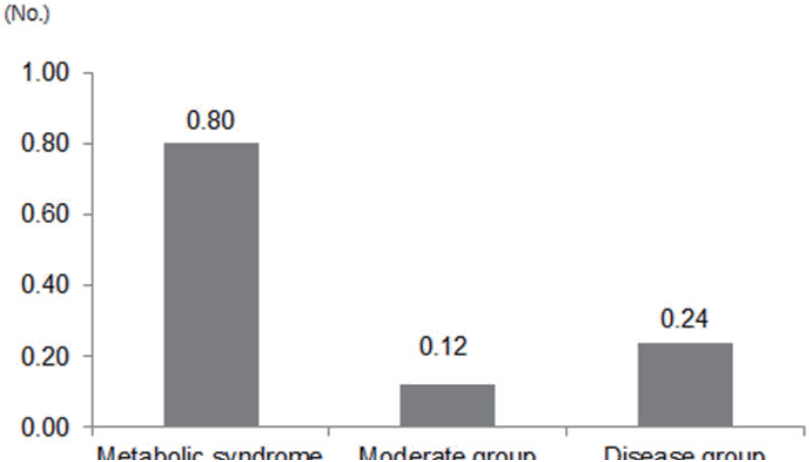
<Table┬Ā1>
Criteria for risk factors of metabolic syndrome and group classification
<Table┬Ā2>
Socio-demographic characteristics according to metabolic groups (unit: n, %)
| Category | Total (N=69,769, 100.0) | Metabolic syndrome group (N=12,293, 17.6) | Moderate group (N=32,775, 47.0) | Disease group (N=15,349, 22.0) | Healthy group (N=9,379, 13.4) | p-value1) | ||||||
|---|---|---|---|---|---|---|---|---|---|---|---|---|
| Gender | Woman | 43,216 | 61.9 | 5,931 | 48.2 | 20,784 | 63.4 | 9,574 | 62.4 | 6,927 | 73.9 | <0.001 |
| Man | 26,580 | 38.1 | 6,362 | 51.8 | 11,991 | 36.6 | 5,775 | 37.6 | 2,452 | 26.1 | ||
|
|
||||||||||||
| Age (years) | 20~29 | 4,154 | 6.0 | 457 | 3.7 | 2,387 | 7.3 | 32 | 0.2 | 1,278 | 13.6 | <0.001 |
| 30~39 | 7,477 | 10.7 | 1,354 | 11.0 | 4,284 | 13.1 | 201 | 1.3 | 1,638 | 17.5 | ||
| 40~49 | 12,725 | 18.2 | 2,872 | 23.4 | 6,761 | 20.6 | 1,217 | 7.9 | 1,875 | 20 | ||
| 50~59 | 27,941 | 40 | 4,988 | 40.6 | 12,657 | 38.6 | 7,148 | 46.6 | 3,148 | 33.6 | ||
| 60~64 | 17,499 | 25.1 | 2,622 | 21.3 | 6,686 | 20.4 | 6,751 | 44.0 | 1,440 | 15.3 | ||
|
|
||||||||||||
| Educational level | Below middle school | 9,929 | 14.2 | 1,549 | 12.6 | 3,822 | 11.7 | 3,701 | 24.1 | 857 | 9.1 | <0.001 |
| High school | 18,821 | 27.0 | 3,039 | 24.7 | 8,750 | 26.7 | 4,692 | 30.6 | 2,340 | 24.9 | ||
| Above college | 35,640 | 51.1 | 6,702 | 54.5 | 17,693 | 54.0 | 5,680 | 37.0 | 5,565 | 59.3 | ||
| Non-response | 5,406 | 7.7 | 1,003 | 8.2 | 2,510 | 7.6 | 1,276 | 8.3 | 617 | 6.7 | ||
|
|
||||||||||||
| Living with spouse | Yes | 57,506 | 82.4 | 10,416 | 84.7 | 26,696 | 81.5 | 13,356 | 87.0 | 7,038 | 75.0 | <0.001 |
| No | 12,290 | 17.6 | 1,877 | 15.3 | 6,079 | 18.5 | 1,993 | 13.0 | 2,341 | 25.0 | ||
|
|
||||||||||||
| Monthly income (unit: won) | Ōēż1,999,999 | 12,053 | 17.3 | 1,891 | 15.4 | 4,965 | 15.1 | 3,831 | 25.0 | 1,366 | 14.6 | <0.001 |
| 2,000,000~3,999,999 | 32,271 | 46.2 | 5,953 | 48.4 | 15,583 | 47.5 | 6,424 | 41.9 | 4,311 | 46.0 | ||
| Ōēź4,000,000 | 13,752 | 19.7 | 2,440 | 19.8 | 6,703 | 20.5 | 2,500 | 16.3 | 2,109 | 22.5 | ||
| Non-response | 11,720 | 16.8 | 2,009 | 16.4 | 5,524 | 16.9 | 2,594 | 16.8 | 1,593 | 16.9 | ||
|
|
||||||||||||
| Smoking status | Non smoker | 56,410 | 80.8 | 9,080 | 73.9 | 26,960 | 82.3 | 12,003 | 78.2 | 8,367 | 89.2 | <0.001 |
| Former smoker | 7,355 | 10.5 | 1,607 | 13.1 | 3,117 | 9.5 | 2,082 | 13.6 | 549 | 5.9 | ||
| Current smoker | 6,031 | 8.7 | 1,606 | 13.0 | 2,698 | 8.2 | 1,264 | 8.2 | 463 | 4.9 | ||
|
|
||||||||||||
| Drink alcohol | Yes | 37,583 | 53.8 | 6,753 | 54.9 | 17,760 | 54.2 | 8,042 | 52.4 | 5,028 | 53.6 | <0.001 |
| No | 32,213 | 46.2 | 5,540 | 45.1 | 15,015 | 45.8 | 7,307 | 47.6 | 4,351 | 46.4 | ||
|
|
||||||||||||
| Practice of exercise | Don't try | 1,924 | 2.8 | 336 | 2.7 | 859 | 2.6 | 453 | 3.0 | 276 | 2.9 | <0.001 |
| Will be try | 24,266 | 34.8 | 4,590 | 37.3 | 11,535 | 35.2 | 4,998 | 32.6 | 3,143 | 33.5 | ||
| Be trying | 43,606 | 62.4 | 7,367 | 60.0 | 20,381 | 62.2 | 9,898 | 64.4 | 5,960 | 63.6 | ||
<Table┬Ā3>
Comparison of metabolic risk factors between baseline and after 12months according to metabolic groups (unit: mean┬▒SD)
| Category2) |
Metabolic syndrome group |
Moderate group |
Disease group |
Healthy group |
||||
|---|---|---|---|---|---|---|---|---|
| Baseline | After 12month3) | Baseline | After 12month3) | Baseline | After 12month3) | Baseline | After 12month3) | |
| WC (cm) | 89.0┬▒7.9 | 88.1┬▒7.8** | 81.3┬▒7.7 | 81.3┬▒7.6 | 85.6┬▒8.3 | 85.4┬▒8.2** | 76.0┬▒6.5 | 76.6┬▒6.9** |
|
|
||||||||
| man | 91.5┬▒7.2 | 90.6┬▒7.0** | 84.8┬▒6.8 | 84.9┬▒6.7** | 89.1┬▒7.6 | 89.0┬▒7.5** | 80.3┬▒6.2 | 81.2┬▒6.4** |
|
|
||||||||
| Woman | 86.3┬▒7.7 | 85.3┬▒7.7** | 79.3┬▒7.5 | 79.2┬▒7.4** | 83.4┬▒8.0 | 83.2┬▒7.8** | 74.5┬▒5.9 | 75.0┬▒6.3** |
|
|
||||||||
| SBP (mmHg) | 131.8┬▒14.8 | 127.9┬▒13.7** | 121.8┬▒14.4 | 120.9┬▒13.4** | 127.1┬▒14.8 | 126.0┬▒13.8** | 112.2┬▒9.9 | 113.8┬▒11.5** |
|
|
||||||||
| DBP (mmHg) | 83.3┬▒10.7 | 81.0┬▒10.0** | 77.0┬▒10.4 | 76.7┬▒9.7** | 79.5┬▒10.3 | 79.0┬▒9.8** | 71.3┬▒7.3 | 72.6┬▒8.3* |
|
|
||||||||
| FBG (mg/dL) | 105.9┬▒21.6 | 103.1┬▒19.4** | 95.9┬▒13.8 | 96.1┬▒12.5** | 104.6┬▒25.1 | 104.6┬▒23.4 | 88.7┬▒7.5 | 92.2┬▒11.1** |
|
|
||||||||
| HDL (mg/dL) | 41.2┬▒10.8 | 46.1┬▒11.4** | 51.7┬▒13.7 | 54.5┬▒13.3** | 50.7┬▒14.0 | 53.2┬▒13.5** | 61.8┬▒11.8 | 62.2┬▒13.0** |
|
|
||||||||
| man | 39.2┬▒10.6 | 43.4┬▒10.5** | 48.1┬▒12.9 | 49.7┬▒12.1** | 46.0┬▒12.9 | 48.3┬▒12.5** | 53.5┬▒10.4 | 54.3┬▒11.7** |
|
|
||||||||
| Woman | 43.3┬▒10.7 | 49.0┬▒11.5** | 53.8┬▒13.7 | 57.2┬▒13.2** | 53.4┬▒13.9 | 56.1┬▒13.3** | 64.8┬▒10.8 | 64.9┬▒12.3 |
|
|
||||||||
| TG (mg/dL) | 205.1┬▒101.7 | 176.1┬▒90.1** | 123.1┬▒64.1 | 124.6┬▒63.6** | 146.4┬▒83.6 | 145.5┬▒79.8 | 87.8┬▒25.9 | 99.7┬▒44.9** |
|
|
||||||||
| Number of metabolic risk factors | 3.42┬▒0.62 | 2.62┬▒1.24** | 1.44┬▒0.50 | 1.32┬▒1.07** | 3.32┬▒1.28 | 3.09┬▒1.37** | 0.00 | 0.51┬▒0.80** |
ņ░ĖĻ│Āļ¼ĖĒŚī
1. ĒÖ®ņØĆņĢĀ. ŃĆīņØśņøÉĻĖē ļ¦īņä▒ņ¦łĒÖśĻ┤Ćļ”¼ņĀ£ŃĆŹņØś ņØśļŻīņåīļ╣äņ×É ņłśņÜ®ņä▒ĒÖĢļīĆ ļ░®ņĢł. ņåīļ╣äņ×ÉņĀĢņ▒ģļÅÖĒ¢ź. 2012;32:1ŌĆō26.
2. ņ¦łļ│æĻ┤Ćļ”¼ļ│ĖļČĆ. 2008-2016 ņ¦ĆņŚŁĻ▒┤Ļ░ĢĒåĄĻ│ä ĒĢ£ļłłņŚÉ ļ│┤ĻĖ░. ņ¦łļ│æĻ┤Ćļ”¼ļ│ĖļČĆ; 2017.
3. Lim S, Shin H, Song JH, Kwak SH, Kang SM, Won Yoon J, et al. Increasing prevalence of metabolic syndrome in Korea: the Korean National Health and Nutrition Examination Survey for 1998-2007. Diabetes care. 2011;34(6):1323ŌĆō8.



4. Alberti KG, Zimmet PZ. Definition, diagnosis and classification of diabetes mellitus and its complications. Part 1: diagnosis and classification of diabetes mellitus provisional report of a WHO consultation. Diabetic medicine : a journal of the British Diabetic Association. 1998;15(7):539ŌĆō53.


5. Douma S, Petidis K, Doumas M, Papaefthimiou P, Triantafyllou A, Kartali N, et al. Prevalence of primary hyperaldosteronism in resistant hypertension: a retrospective observational study. Lancet. 2008;371(9628):1921ŌĆō6.


6. Mottillo S, Filion KB, Genest J, Joseph L, Pilote L, Poirier P, et al. The metabolic syndrome and cardiovascular risk a systematic review and meta-analysis. Journal of the American College of Cardiology. 2010;56(14):1113ŌĆō32.


7. K.B C, Ferrari. METABOLIC SYNDROME AND OBESITY: EPIDEMIOLOGY AND PREVENTION BY PHYSICAL ACTIVITY AND EXERCISE. J Exerc Sci Fit. 2008;6(2):87ŌĆō96.
8. Ford ES, Giles WH, Dietz WH. Prevalence of the metabolic syndrome among US adults: findings from the third National Health and Nutrition Examination Survey. Jama. 2002;287(3):356ŌĆō9.


9. ļ░Ģņ░¼ļ»Ė, ņןņäĀļ»Ė, ņןņłśĒśä, ņØ┤Ēś£ņ¦ä, Ļ╣Ćņ░Įņłś, ļ░ĢņØ┤ļ│æ. ņ╣śļŻīņ¦ĆņåŹņä▒ņŚÉ ļö░ļźĖ ņØśļŻīņØ┤ņÜ® ļ░Å Ļ▒┤Ļ░ĢĻ▓░Ļ│╝ ļČäņäØ - Ļ│ĀĒśłņĢĢ, ļŗ╣ļć©ļź╝ ņżæņŗ¼ņ£╝ļĪ£ -. Ļ▒┤Ļ░Ģļ│┤ĒŚśņŗ¼ņé¼ĒÅēĻ░ĆņøÉ. 2010;10.

10. National Health Insurance Service. Korean Diabetes Fact Sheet [Internet]. Korean Diabetes Association. 2015. Available from: http://www.diabetes.or.kr.
11. World Health Organization. Action Paln on the Global Stratege for the Prevention and Control of NCDs. WHO; 2005.
12. ļīĆņé¼ņ”ØĒøäĻĄ░Ļ┤Ćļ”¼ņé¼ņŚģņ¦ĆņøÉļŗ©. 2017 ļ│┤Ļ▒┤ņåī ļ¬©ļŗłĒä░ļ¦ü Ļ▓░Ļ│╝ļ│┤Ļ│Āņä£. ļīĆņé¼ņ”ØĒøäĻĄ░Ļ┤Ćļ”¼ņé¼ņŚģņ¦ĆņøÉļŗ©; 2017.
13. ņØ┤ņĀĢņłś. ņØ╝ļ│ĖņØś ĻĄŁĻ░ĆņĀü ļīĆņé¼ņ”ØĒøäĻĄ░ Ļ┤Ćļ”¼ļīĆņ▒ģ ļ░Å ĒśäĒÖ®. ĒĢ£ĻĄŁņŗØĒÆłņśüņ¢æĻ│╝ĒĢÖĒÜī. 2010;15(1):4ŌĆō9.
14. ļ░░ņĀĢĒĢś. ļŗ╣ļć©ĻĄÉņ£Ī ĒöäļĪ£ĻĘĖļשņØ┤ ļŗ╣ļć©ļ│æĒÖśņ×ÉņØś ņ¦ĆņŗØ, ņ×ÉĻĖ░ĒÜ©ļŖź, ņ×ÉĻ░ĆĻ░äĒśĖ Ē¢ēņ£äņŚÉ ļ»Ėņ╣śļŖö ņśüĒ¢źņŚÉ ļīĆĒĢ£ ņŚ░ĻĄ¼(ņØ╝ ļ│æņøÉņØä ņżæņŗ¼ņ£╝ļĪ£). ņŖżĒżņĖĀĻ│╝ĒĢÖņŚ░ĻĄ¼ļģ╝ļ¼Ėņ¦æ. 2002;20:39ŌĆō53.
15. Lappalainen R, Sairanen E, Jarvela E, Rantala S, Korpela R, Puttonen S, et al. The effectiveness and applicability of different lifestyle interventions for enhancing wellbeing: the study design for a randomized controlled trial for persons with metabolic syndrome risk factors and psychological distress. BMC public health. 2014;14:310.




16. ņ×äļ»Ėņśü, ņØ┤ņśüļ×Ć, ĒĢ£ņłÖņĀĢ, ņĪ░ņĀĢļ»╝. ĒĢ£ĻĄŁņØĖņØś ļīĆņé¼ņ”ØĒøäĻĄ░ņŚÉ ļīĆĒĢ£ ņāØĒÖ£ņŖĄĻ┤Ć ņÜöņØĖņØś ņśüĒ¢ź. ņ¦ĆņŚŁņé¼ĒÜīĻ░äĒśĖĒĢÖĒÜīņ¦Ć. 2012;23(1):13ŌĆō21.
17. Lee H-S, Kwon CS. Prevalence of metabolic syndrome and related risk factors of elderly residents in andong rural area 1. based on the anthropometric measurements and health behaviors. Journal of the Korean Society of Food Science and Nutrition. 2010;39(4):511ŌĆō7.


18. ņĄ£ņśüĒśĖ, ņןņłÖļ×æ, Ļ│ĮĻ▓ĮņäŁ, ļ¼Ėņ£ĀņäĀ, ņŗĀĒĢ┤ļ”╝, ņĄ£ņÜ®ņżĆ, et al. ņČśņ▓£ ņ¦ĆņŚŁ ņżæļģä ļ░Å ļģĖņØĖņŚÉņä£ņØś ļīĆņé¼ņ”ØĒøäĻĄ░ņØś ņ£Āļ│æļźĀĻ│╝ Ļ┤ĆļĀ©ņÜöņØĖ ļČäņäØ. 2004;44:1.
19. Yoo J, Jeong J, Park C, Kang S, Ahn J. Impact of Life Style Characteristics on Prevalence Risk of Metabolic Syndrome. JOURNAL OF KOREAN ACADEMY OF NURSING. 2009;39(4):p594-p601, 8p.

20. ņØ┤ņ¦ĆņØĆ, ņØ┤ņØĆņŻ╝. Ļ▒┤Ļ░ĢĒ¢ēņ£ä ņØ┤Ē¢ēņ£©ņŚÉ ļö░ļźĖ ļīĆņé¼ņ”ØĒøäĻĄ░ ļ░£ņāØ ņ£äĒŚśņÜöņØĖ ļ│ĆĒÖö. ĒĢ£ĻĄŁļŹ░ņØ┤Ēä░ņĀĢļ│┤Ļ│╝ĒĢÖĒÜīņ¦Ć. 2017;28(3):559ŌĆō71.
21. ņ£żņä▒ņÜ®. ņÜ░ĻĘ╣Ēśä, Ļ╣ĆĒÖöņä▒, Ļ╣ĆņÜ®ļ░░, Ļ╣Ćņ¦äņäØ, ņĪ░ņä▒ņÜ®, et al. ņ░ĖņŚ¼ĒśĢ Ļ░£ņäĀĻĖ░ļ▓Ģ(PAOT)ņØś ņøÉļ”¼ļź╝ ņĀüņÜ®ĒĢ£ ļīĆņé¼ņ”ØĒøäĻĄ░ Ļ┤Ćļ”¼ ĒöäļĪ£ĻĘĖļש ĒÜ©Ļ│╝ļČäņäØ ļ│┤Ļ▒┤ ĻĄÉņ£Ī┬ĘĻ▒┤Ļ░Ģņ”Øņ¦äĒĢÖĒÜīņ¦Ć. 2014;31:81ŌĆō95.
- Related articles in PHA





